#death consul
Explore tagged Tumblr posts
Text
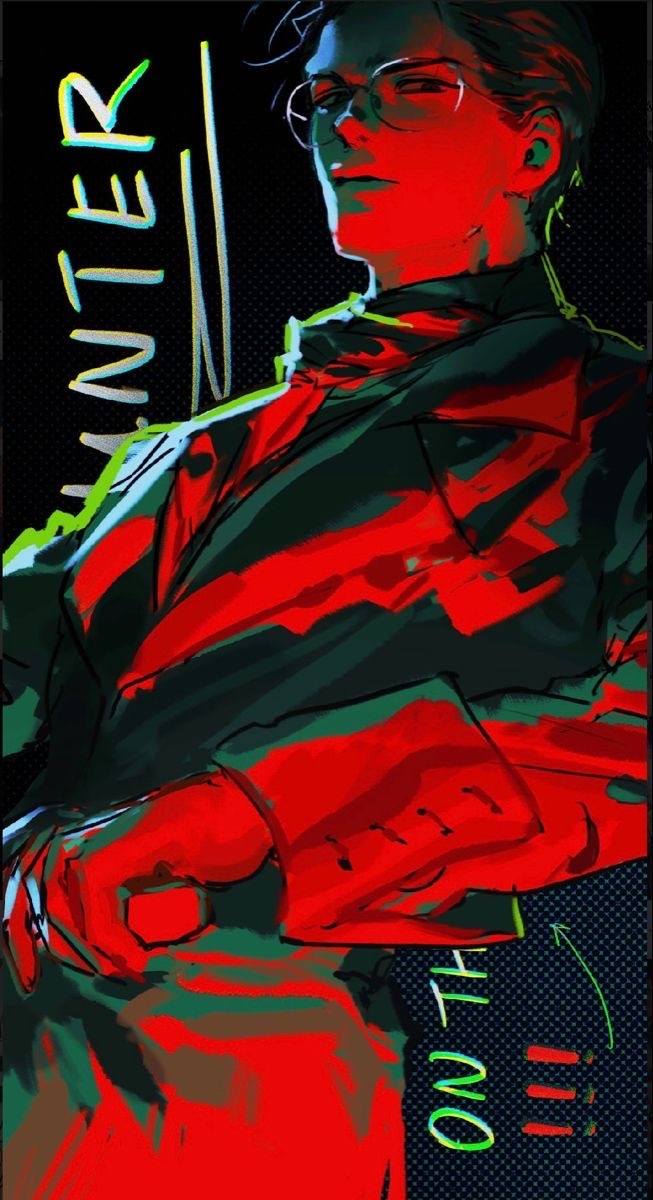
#gherman sparrow#lord of the mysteries#the fool#sherlock moriarty#dwayne dantes#merlin hermes#lotm#mr fool#klien moretti#tarot club#reinette tineker#emperor roselle#lady of concealment#angel of war#angel of redemption#gherman sparrow fanart#gherman fanart#klien moretti fanart#klein moretti#klein lotm#lotm 2#lotm fanart#light novel#tingen era#evernight goddess#daly simone#hunting dog#death consul#tingen city#circle of inevitability
142 notes
·
View notes
Text

Welcoming the Year of the Snake with Mr. Azik!
#art#artist#artist on tumblr#digital art#illustration#lord of the mysteries#lordofthemysteries#lotm#fanart#azik eggers#death consul#snake
30 notes
·
View notes
Text

Letter from my student
#azik eggers#lotm#lotm fanart#lord of the mysteries#lord of mysteries#fanart anime#circle of inevitability#coi#azik#angel of death#death consul#mr. azik#death pathway#fourth epoch#klein moretti
8 notes
·
View notes
Text
@y-rhywbeth2 i can't remember if you've talked about this or not but in case you haven't: how do you interpret the unholy assassins? does becoming one mean becoming a member of a bhaal-sponsored assassins' guild, or the clergy, or a new/local order of specialty priests?
going off of dolor and olfaith olumssdottir, candidates are chosen from people who already worship bhaal and/or do a lot of murder, who aren't already members of the temple--so, non-clergy. narratively, just looking at bg3, it mirrors what shadowheart has to do to become a dark justiciar: go through trials, be deemed worthy, sacrifice a celestial.
all bhaal cultist ranks in bg:dta / bg3 get some amount of god-granted magic abilities but looking at the banites and myrkulites, it seems fair to me to interpret only the highest rank as having cleric-type abilities. if we use the fact that the dead three cults are presented as being symmetric and extend this logic to the bhaalists, it gets us 'night blades' and 'reapers' being non-priest… acolytes? aspirants? lay brothers/sisters? simply congregation members? and 'death's heads' being priests and definitively clergy.
where do 'unholy assassins' go here?
#i'm not asking for The Answer (because i'm aware there isn't one) just Your Take#the *interpretation* that makes most sense to you#like is 'unholy assassin' meant to mean the same thing as deathdealer or deathstalker or is it just... a title with unclear privileges??#my personal interpretation is that becoming an unholy assassin is what grants you access to the temple#which is necessary but not sufficient to entering the priesthood (in the baldur's gate enclave headed by durge/orin)#so all night blades reapers and death's heads are also unholy assassins but only death's heads are full members of the priesthood#(the real answer is quite possibly that what 'unholy assassin' meant in terms of the greater religion Simply Was Not Considered lol)#fittingly priesthood membership is clearest among the banites imo#fists are simple fighters iron consuls are their commanders and only black gauntlets have cleric/paladin powers#in bg3 the iron consuls can cast silence and their voice of command ability doesn't just let allies make an attack but do a smite-type thin#but in bg:dia the cultists are enemies meant to be encountered at levels 1-4 & in bg3 they're encountered at levels 10-12#so they needed a power-up and the easiest way is to give them spells so i'm not going to take it too seriously#origpost#loreposting
16 notes
·
View notes
Text
I know this is probably just because I’m in the industry, but I’m constantly surprised that people think they can just hop on an international flight with cremated remains.
#aron's opinonion#death industry#person wants to scatter in Germany#and if I remember correctly#Germany is Very Strict about cremated remains#I told them to call the embassy or consulate
14 notes
·
View notes
Text


It says a lot about Xenoblade 3 that the time death scenes take up is almost 10x the amount time of goofy scenes take up
#xenoblade chronicles 3#xenoblade 3#tbf the first video is likely counting all the consul deaths that occur during hero/ascension quests#but the 10:1 ratio is very funny still#XC2: At first I lol’d#XC3: and then I serious’d
35 notes
·
View notes
Text



April 1, 1971 - From red. media:
On this day in 1971, German communist Monika Ertl assassinated Roberto Quintanilla, the Bolivian officer responsible for Che Guevara’s execution. Surprisingly, Ertl was the daughter of a Nazi propagandist who had fled to Bolivia. She was raised surrounded by her family's Nazi friends, such as Gestapo chief Klaus Barbie, aka the "Butcher of Lyon", who British director Kevin Macdonald alleges orchestrated Guevara's murder. Monika cut ties with her fascist family and grew closer to the Communist cause. She was deeply moved by Che Guevara's assassination in 1967 which led to her joining the National Liberation Army of Bolivia (ELN), which Che headed prior to his death. Under her new nom de guerre, “Imilla”, she worked with Che's former comrades to hunt down his killer. In 1971, Monika arrived in the German city of Hamburg, where she looked for Pereira, who was working at the Bolivian Consulate. Monika gunned down Che's killer with three shots to the chest. As she escaped, she left behind her purse, a wig, a revolver, and a piece of paper with the words "Victory or Death - ELN". The killing was soon linked to her and the US-backed Bolivian dictatorship put a $20,000 bounty on her head. However, Monika successfully returned to Bolivia with more targets on her mind, including her family's Nazi friends. In 1973, after several days of surveillance, CIA trained special units ambushed and murdered Monika in the capital city of La Paz. Her body was never found. Monika was dubbed “the avenger of Che”, a name that made headlines around the world.
#1971#monika ertl#communism#che guevara#guerrilla#resistance#anti-imperialism#us-imperialism#bolivia#germany#ELN#hamburg#deutschland#Ejército de Liberación Nacional
1K notes
·
View notes
Text
Israel has just bombed a hospital where hundreds of wounded and refugees were taking solace. Journalists in Gaza have reported there was hardly a single body whole in the aftermath (If you can stomach it, there's a video of a father holding what remains of his child). At least 500 people killed by IOF soldiers, who planned this action, got into an airplane and dropped that bomb willingly. The deadliest attack in five wars, according to the Ministry of Health.
Israel has denied ownership of the attack and said it was a misfired Hamas rocket. Originally, they celebrated it on their social media, saying they had destroyed a Hamas target, treating the deaths like an unfortunate collateral. After international backlash, they posted videos to their social media claiming it was a Hamas rocket. The video, though, shows a second explosion 40 minutes after the airstrike, and they edited it our of their tweet in a pathetic attempt at covering up.
Israel has said multiple times that they were going to bomb hospitals. They told doctors to evacuate and leave their patients to death because they were going to bomb, namely: Al Shifa, Shuhada Al Aqsa and the Quwaiti Hospital. Al Shifa housed at least 10.000 refugees and wounded, and worked as a hub for the press because it was one of the only hospitals that still had working generators. Medical crew worked with sirens blaring to signal the hospitals were not empty. This was a purposeful massacre. These people died hungry, thirsty and in pain because of the Israeli government's cruelty.
CNN and other media outlets already tried to pin the blame on Hamas, parroting back the pathetic propaganda being sold by the IOF. Even in death, Palestinians can't be respected and are used to further their own oppression. These people's deaths are not going to be in vain. Within our lifetimes, Palestine will be free.
Take action. The Labour Party in the UK had an emergency meeting today after several councilors threatened to resign if they didn't condemn Israeli war crimes. Calling to show your complaints works.
FOR PEOPLE IN THE USA: USCPR has developed this toolkit for calls
FOR PEOPLE IN THE UK: Friends of Al-Aqsa UK and Palestine Solidarity UK have made toolkits for calls and emails
FOR PEOPLE IN GERMANY: Here's a toolkit to contact your representatives by Voices in Europe for Peace
FOR PEOPLE IN IRELAND: Here's a toolkit by Voices in Europe for Peace
FOR PEOPLE IN POLAND: Here's a toolkit by Voices in Europe for Peace
FOR PEOPLE IN DENMARK: Here's a toolkit by Voices in Europe for Peace
FOR PEOPLE IN SWEDEN: Here's a toolkit by Voices in Europe for Peace
Protests in support have already erupted in Beirut, Madrid and Rabat in response to the shelling of the hospital. Join your local protest and raise your voices. For people in the US, Israel has just asked for additional $10bi in aid on top of the annual $3.8bi already given to them. Palestinians are asking that you refuse this loudly, with their every breath.
Here's a constantly updating list of protests:
Global calendar
USA calendar
Here are upcoming events:
WASHINGTON, DC: Outside Congress on 18/10 at 12 PM
WASHINGTON, DC: NATIONAL MARCH in front of the White House on 4/11 at 12 PM
SAN DIEGO: 2125 Pan American E Rd. (Spreckles Organ Pavillion) on 18/10 at 7 PM
NEW YORK: 72nd st. And 5th ave., Brooklyn on 21/10 at 2 PM
NEW YORK: CUNY Grad Building on 18/10 at 2 PM
NEW YORK: Oct 18, 5pm, Steinway & Astoria Blvd.
DALLAS: 1954 Commerce Street (Dallas Morning News Building) on 19/10 at 3 PM
[CAR RALLY] KITCHENER-WATERLOO: Fairview Park, 2960 Kingsway Dr. on 18/10 at 6 PM
KITCHENER-WATERLOO: CBC Building, 117 King St. W on 19/10 at 5 PM
HOUSTON: Zionist Consulate, 24 Greenway Plaza on 18/10 at 4 PM
OMAHA: 72nd St & Dodge St on 18/10 at 6 PM
SAINT PAUL, MN: Oct. 18, 5:30pm. State Capitol, 75 Rev Dr Martin Luther King Jr. Blvd.
BALTIMORE: Oct 20, 6pm. Baltimore City Hall
DUBLIN: Leinster House, Kildare Street, Dublin 1 on 18/10 at 5 PM
THURLES: Liberty Square on 19/10 at 7 PM
LURGAN: Market Street on 21/10 at 3 PM
PORTO ALEGRE: Rua João Alfredo, 61 on 18/10 at 19h
RIO DE JANEIRO: Cinelândia on 19/10 at 17h
RECIFE: Parque Treze de Maio on 19/10 at 17h
MANAUS: Teatro Amazonas, Largo de São Sebastião on 19/10 at 17h
SÃO PAULO: Praça Oswaldo Cruz on 22/10 at 11h
FOZ DO IGUAÇU: Praça da Paz on 22/10 at 9h
TSHWANE: Belgrade Square Park, Jan Shoba Street on 20/10 at 10 AM
VEREENIGING: Roshnee Sports Grounds on 21/10 at 14h30
Feel free to add more resources
9K notes
·
View notes
Text
'I am no king, but Caesar'

Gaius Julius Caesar was born on July 12, 100 BC in the Suburra, a populous neighborhood of Rome, to a patrician family although in economic decline. In Gens Iulia, those who had the surname Caesar descended, according to the account of Pliny the Elder, from a man who was born after a Caesarean section (from the Latin verb "to cut", caedo, -ĕre, caesus sum). He was born in a Republic in crisis and the aristocracy divided into two warring factions: The optimates and populares. He lost his father when he was about 14 years old; he was greatly influenced by his maternal uncle Gaius Marius. Caesar had an older sister, Julia Major, and a younger sister Julia Minor (maternal grandmother of Emperor Augustus). His uncle, Gaius Marius, was the leader of the Populares ("supporters of the people") and rival of Lucius Cornelius Sulla, leader of the Optimates ( "best ones")

In 84 BC Lucius Cornelius Cinna, an ally of Gaius Marius, chose the 16 year old Caesar to be flamen Dialis (priest of Jupiter) and married him to his 13 year old daughter Cornelia with whom Caesar had a daughter named Julia. It is not certain whether the girl was born a few months before or after the teen Caesar had fled Rome or, more likely according to historians, she was born when he returned years later and was reunited with his wife.
Following the suicide of Gaius Marius in 86 BC, Cinna, one of the leaders of the Populares, became sole ruler of Rome and most of the provinces while persecuting Sulla's followers. In 84 Cinna was assassinated and populares defeated.
Due of his ties to the Cinna family, Sulla attempted to force Caesar to divorce Cornelia if he wanted to live in peace, but Caesar refused. Sulla confiscated his property, and he was forced to leave Rome. Populares supporters and Caesar's own mother pressured Sulla to allow him to return, claiming that he was not dangerous as he was just an adolescent. Sulla refused and said "I see several Marius in him" referring to his archrival Gaius Marius, Caesar's uncle.
Shortly afterwards, although he was allowed to return to Rome, Caesar decided to head to Asia to participate in the war against Mithridates VI of Pontus. There he distinguished himself in the capture of Mytilene. He then headed to Bithynia, a kingdom allied to Rome, where he spent some time.

In addition to being a politician and a soldier, Julius Caesar was a writer. Among others, his works were a treatise on astronomy, another on Roman religion, a study on Latin and his comments on the war in Gaul and the Civil War; only his writings on those two wars have not been lost.
In the year 78 after Sulla's death from natural causes, Caesar decided finally to return to Rome. He was reunited with his wife Cornelia, who had waited patiently for him. Nine years later, Cornelia- the only woman he truly loved, according to all accounts- died at the age of 28. Caesar went into deep mourning and gave a solemn speech.

After serving as quaestor in the Hispania Ulterior province where he increased his network of clients - patronage was key to success in Roman politics - Caesar returned to Rome in 69 BC where he served as Aedile; he carried out building programs and offered the largest gladiatorial games seen until then. This left him almost bankrupt. In 60 BC he decided to make a private agreement with the prestigious general Pompey the Great and one of the richest man, Marcus Licinius Crassus. Pompey had just put an end to the pirate problem and years earlier, together with Crassus, he had defeated the slave rebellion led by Spartacus.
Pompey and Crassus were hampered in many of their ambitions by the Optimates in the Senate. Caesar, knowing this, approached them to put together an unofficial coalition - known to history as the Triumvirate - if they made him Consul, he would see to it that laws were passed that would benefit them. To further consolidate this alliance, in the year 59 BC Caesar married Pompey to Julia. Although this was a typical political marriage, classical sources state that Julia truly loved Pompey and he loved her.
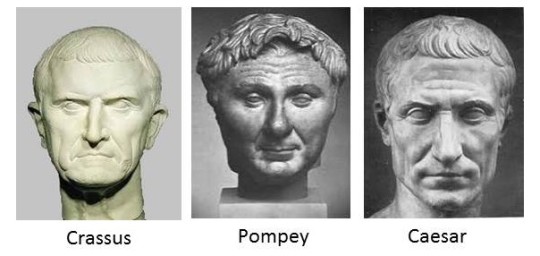
Pompey and Crassus decided to ally themselves with Caesar and the populares in order to gain more offices and wealth. In this way, the three took full control of Rome. In 59 Caesar was appointed consul.
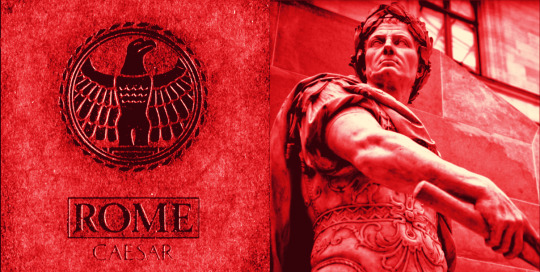
Laws were passed granting the province of Syria to Crassus. Laws were passed distributing lands among Pompey's veterans. And at his own request, the Gallic provinces-both the pacified and the "wild" ones- were handed over to Caesar. Cicero, a true defender of the Republic, was exiled due his bold speeches against the Triumvirate, which he called a "three-headed monster" but was allowed to return the following year. The passage of the laws favoring the triumvirs was ensured by introducing veteran legionaries of Pompey into the meetings of the Senate.
Also in 59 BC Caesar established a military camp in the Arno valley, on the Via Cassi, the main communication route between Rome and the north of the country. He called the camp Florentia, which means "flowering." The camp quickly became an important commercial town. Today it is the beautiful Italian city Florence.

In Gaul with his legions, he defeated and subdued several peoples in just a few years. Caesar wrote in detail about this conquest in his Bellum Gallicum (Gallic War). Believing that everything was under control, he headed to the mysterious land that the Romans called Britannia and where they believed the world ended. The Gallic War was between 58-52 BC

Caesar finally arrived in Britain for the first time in the summer of 55 landing with two legions. The following year he arrived with 800 ships, five legions and 2,000 cavalry. Caesar's comments on this war constitute the first written descriptions of the people, culture and geography of the island.

Although Caesar not conquered Britania (it was conquered under the Emperor Claudius) this campaign it established Rome's first allied peoples in Britain.
While in Britania, Caesar received the news that his daughter and the baby she was expecting had died in childbirth.
At the same time he had no idea that a genuine leader named Vercingetorix, of the Arverni tribe, had managed to unite all the Gallic peoples under his authority, determined to expel the Romans
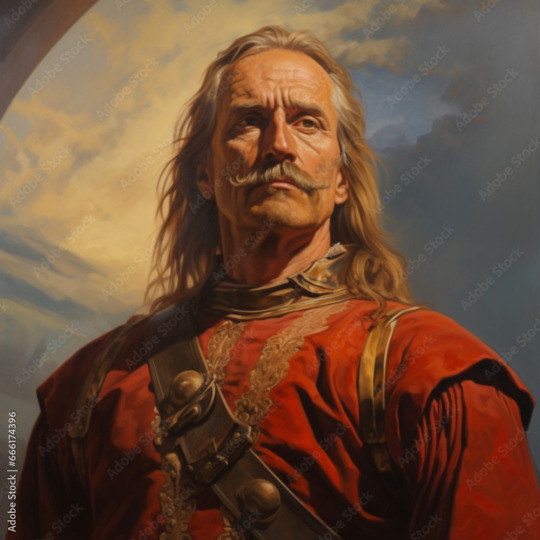
Caesar himself called him "King of all the Gauls"
The most famous and final battle was that of Alesia. Although Vercingetorix was a great warrior, he could do nothing against the genius (sometimes bordering on madness) of Caesar and his legionaries. According to Caesar, Vercingetorix, seeing that if he continued he would starve his entire people to death due to the siege, rode towards the Roman camp, dismounted, took off his sword and sat on the ground without saying a word. He decided to surrender in exchange for his people living. And so it happened, Vercingetorix was taken prisoner but his men were not executed. But Caesar had to wait years for his triumph -and Vercingetorix had to wait as a prisoner in Rome, before his execution- because while Caesar was fighting against the Gauls, many Roman senators were plotting his downfall.

Everything Caesar wrote about his battles and conquests, written in the third person, was copied and sent to be read publicly in Rome, which was celebrated by the plebs and Caesar 's supporters. True republicans such as Cato, Cicero, Cassius, and Brutus perceived a real danger to the Republic. The Triumvir Crassus was killed by Parthians in his failed attempt to conquer Parthia: The triumvirate was over and Pompey, who had become Sole Consul saw in Caesar a dangerous rival, and allied himself with the Optimates again.
They created a new law: the office of consul or proconsul could no longer be held in absentia, as well as running for those offices outside of Rome. Thus, Caesar, far from Rome, lost the protection of the law that granted him his magistracy—just as today, the President of a nation cannot be prosecuted while in office—and could no longer run for election as consul or proconsul. Clearly, the idea was to put him on trial and send him, hopefully, into exile, since thanks to this law, he instantly became an ordinary citizen.
Upon receiving this news, Caesar was enraged and decided to return to Rome not as a citizen, but as a general commanding his legionaries, who followed him devotedly. He would later say, "I never wanted this war, but my adversaries have eagerly sought it."
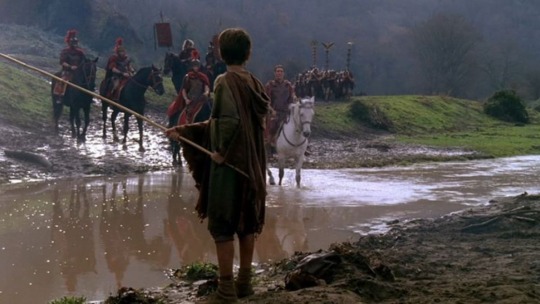
No legion was to reach Rome by crossing the Rubicon River; such an action meant civil war.. Caesar crossed the Rubicon with his XIII legion and proclaimed a very popular phrase in Ancient Rome that players always said before throwing the dice: "Alea Iacta Est" (the die is cast). This is known thanks to Roman historians who took as a source the writings of Gaius Asinius Pollio, who was close to Caesar and could have heard him. This saying became legendary even for the ancient Romans due to the surprising idea of using this phrase from a game in the context of a war.
Pompey and his legionaries left Rome and prepared for the war in Greece. In September of 48 Pompey was defeated at the Battle of Pharsalus. But he did not give up and headed to Egypt to seek the support of the young king Ptolemy XIII. Egypt was then a vassal kingdom of Rome due to its years of indebtedness, and the creditor was precisely Pompey, who had lent huge sums to Ptolemy XII. But as soon as he landed in Egypt, he was met by a group of men who, in the name of the young king, beheaded him and took his ring.
Fun fact: Among those who fought alongside Pompey against Caesar was the centurion Titus Flavius Petro, who after the defeat at Pharsalus was pardoned by Caesar and returned home; he was the grandfather of Titus Flavius Vespasian, the emperor who replaced the Julio-Claudian dynasty with his own Flavian dynasty in 69 AD.
While Cato the Younger and his men went to the province of Africa to continue the resistance, and Pompey's sons did the same in Hispania. Caesar went looking for Pompey to try to come to an agreement.
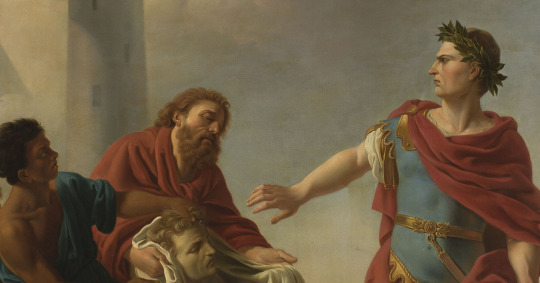
'Julius Caesar’s Dismay Upon Seeing The Head Of Pompey' (detail) By Louis-Jean-François Lagrenée (18th century)
King Ptolemy XIII, who was engaged in his own war with his sister Cleopatra for the throne, thought that by killing Pompey and giving his head and ring as a gift he would earn Caesar's gratitude and thus his kingdom would settle the unpayable debt it owed Rome. But Caesar was enraged by the undignified manner in which a Roman general and consul had been murdered and decided to side with Cleopatra and her allies.
The meeting between Cleopatra VII and Caesar at night and she entered hidden inside a huge rolled-up carpet carried by his slaves. Cleopatra was one of the many lovers that he had, they lived together and had a son, nicknamed Caesarion (little Caesar) whom he recognized but not legally. While Republican forces continued to resist, Caesar was immersed in the war between Ptolemy XIII, Cleopatra and the other sister, Arsinoe IV. Caesar's troops, together with those of Cleopatra plus Caesar's allies such as Mithridates of Pergamon and his army and a Jewish armed force led by Antipater finally won that war in January 47 and Cleopatra kept the throne of Egypt.
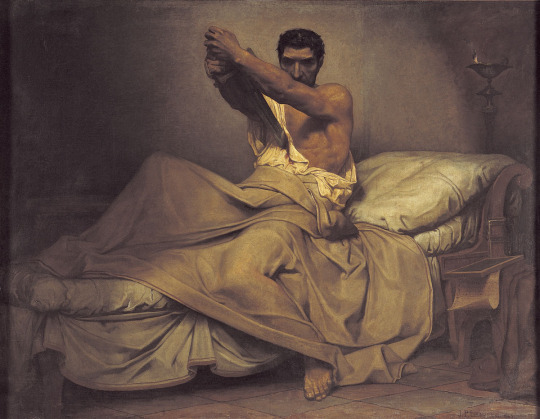
The Death of Cato of Utica, By Jean-Paul Laurens.
In early 46 BC, Caesar defeated the army of Cato the Younger, also known as Cato of Utica . Cato did not take part in the battle and being in Utica, Africa, after receiving the news that Caesar had won and pardoned his adversaries, decided to take his own life at the age of 49. Cato had a republican soul but was stubborn man, and was convinced that Caesar wanted to be king. He was the half-brother of Brutus's mother, Servilla (Caesar's long-time lover).
It was in this same year that Caesar, with the advice of the astronomer Sosigenes of Alexandria, reformed the calendar, leaving each month with the same number of days as it has today and creating the leap year.
The final battle of Munda, in Hispania, was on March 17, 45 BC, thus ending the civil war. Caesar returned to Rome and an intimidated Senate legitimized his victory by appointing him dictator for a ten-year term.
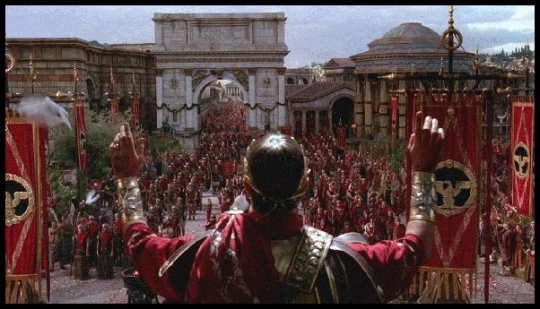
The position of Dictator was created by the Republic itself; he was a magistrate, elected by the Senate, with absolute powers to resolve military emergencies or exceptional tasks for a period of six months. He had to leave after that period or before if he managed to resolve the problem. This 10-year dictatorship was unprecedented.
In February 44 BC, Caesar succeeded in having the people of Rome proclaim him dictator for life. Cicero resigned from political life in protest.
Cassius persuaded Brutus that the only way to save the Republic was to kill Caesar. They needed Brutus to lead the conspiracy because of his prestige; he was not only Cato's nephew but also the direct descendant of the Republic's founding father.
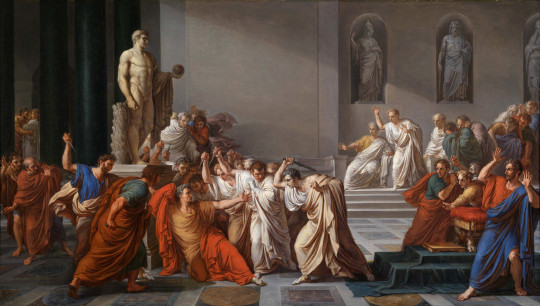
The Death of Caesar. By Vincenzo Camuccini (1805)
On 15 March 44 BC the group of conspirators intercepted Caesar just as he was passing the Theatre of Pompey, where the Roman Curia was meeting, and led him into a room off the portico. Lucius Tillius Cimber, under the pretext of presenting a petition, grabbed Caesar's toga with both hands and pulled him so tha Publius Servilius Casca could stab him, causing Caesar to exclaim "Ista quidem vis est?" ("What kind of violence is this?") Casca, drawing a dagger, slashed him across the neck. "What are you doing, Casca, you villain?" were perhaps his last words.
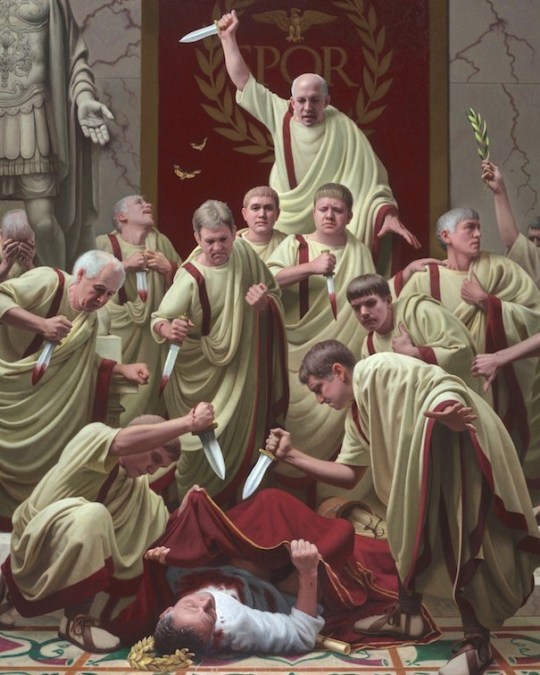
According to classical sources, he tried to flee but slipped on his own blood. A Roman coroner stated that "Caesar's body had several cuts, and 23 stab wounds but only one of them, in the chest, was fatal." They also claim that as he lay dying he took his toga and covered his face so that no one would see him die. He was 55 years old.

Mark Antony with other colleagues carefully collected the body and carried it before the people. Then he made a memorable speech.
The month then called Quintilis, the month of Caesar's birth, was renamed Iulius (July) in his honour on the initiative of Mark Antony. Julius Caesar was the last dictator of Rome; the office was abolished after his death.
Caesar named his grandnephew Gaius Octavius Thurinus as sole heir and adopted son, taking the name Gaius Julius Caesar Octavianus. As was customary in this type of adoption, he had the name of his maternal relative and since then he legally belonged to the family clan, in this case the Julii, adding to his new name the original paternal lineage: Octavianus ( "of the Octavii").
A good example to understand this is the father of Empress Livia, who was born with the name Appius Claudius Pulcher and who, upon being adopted by his maternal uncle Marcus Livius Drusus, changed his name to Marcus Livius Drusus Claudianus.
But nowhere in Caesar will did he say that his nephew should be his successor in office. It was very common among Roman aristocrats without sons to adopt a nephew, son of a sister or niece, or a grandson through a daughter if the father had already died, to continue the surname or clan name (nomen gentile).
If he legally recognized Caesarion, the boy would become a Roman citizen, and it would be a serious problem if the king of Egypt were Roman, as he could claim a throne in Rome. This shows that Caesar did not intend to establish a monarchy and was genuinely concerned about his fatherland.
Octavius certainly benefited from the adoption, but he became the Emperor of Rome thanks to his iron will, extraordinary cunning and political skill.
After his death, Caesar was proclaimed Divus Iulius, or the Divine Julius. He was the first Roman ruler to be deified.
After the end of the Julio-Claudian Dynasty, the cognomen CAESAR would become a Title of the Imperial Power, even many centuries later translated into other languages, such as the German Kaiser or the Russian Tsar.

In front of the theatre, an altar was erected where the pyre was placed so that Julius Caesar's body could be cremated in great mourning. Part of this altar is still preserved in the ruins; more than two thousand years after the assassination, every 15th of March, people come to leave flowers there.
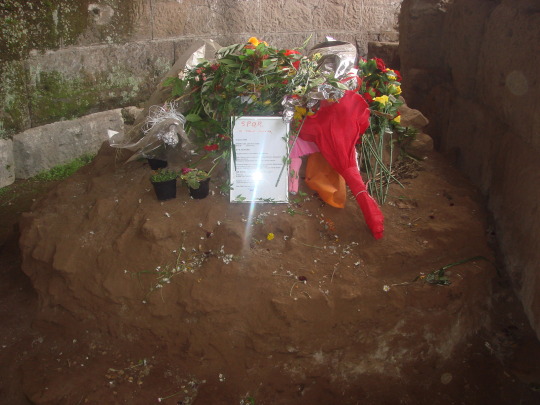
Photo by Giovanni Dall'Orto, taken on March 15, 2008 Attribution, via Wikimedia Commons
190 notes
·
View notes
Text

#mr azik#death consul#angel of death#gherman sparrow#lord of the mysteries#lotm#the fool#sherlock moriarty#dwayne dantes#merlin hermes#mr fool#klien moretti#tarot club#true creator#angel of time#reinette tineker#tarot#my fool#klein moretti#merlin#mysteries#lady of concealment#lady of crimson#mr star
66 notes
·
View notes
Text
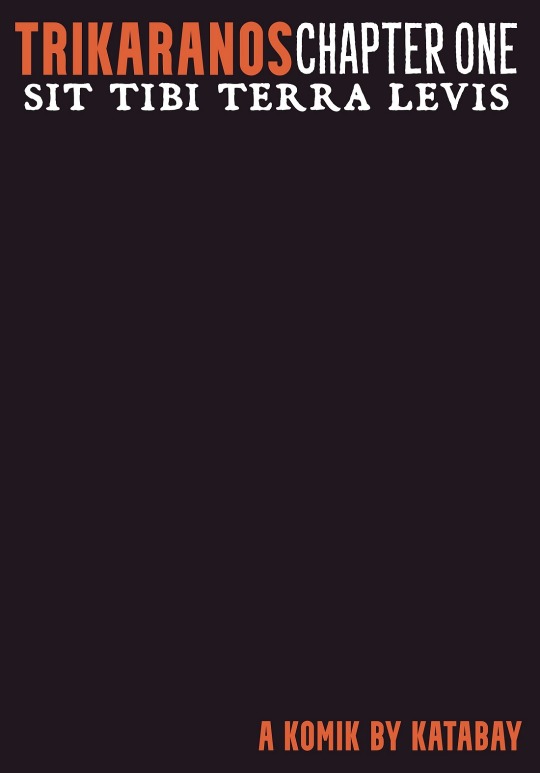
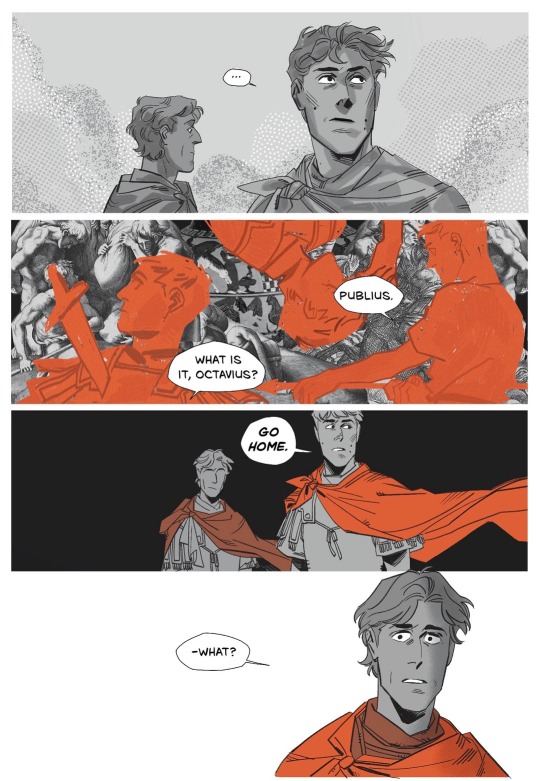
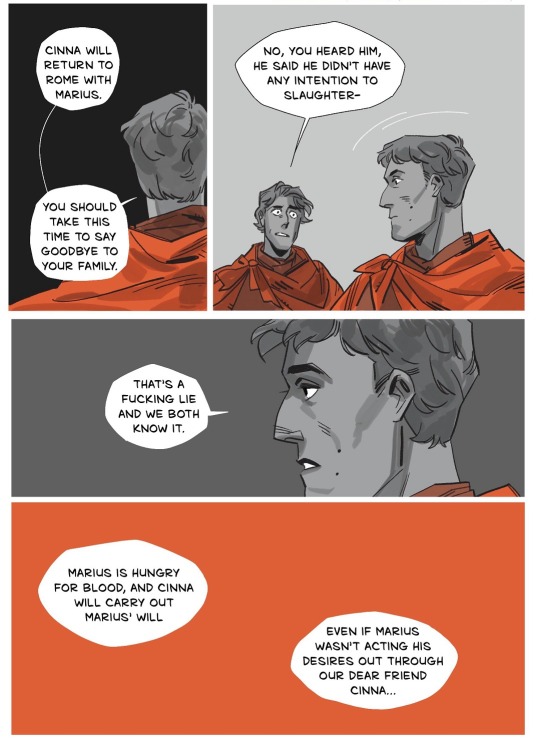
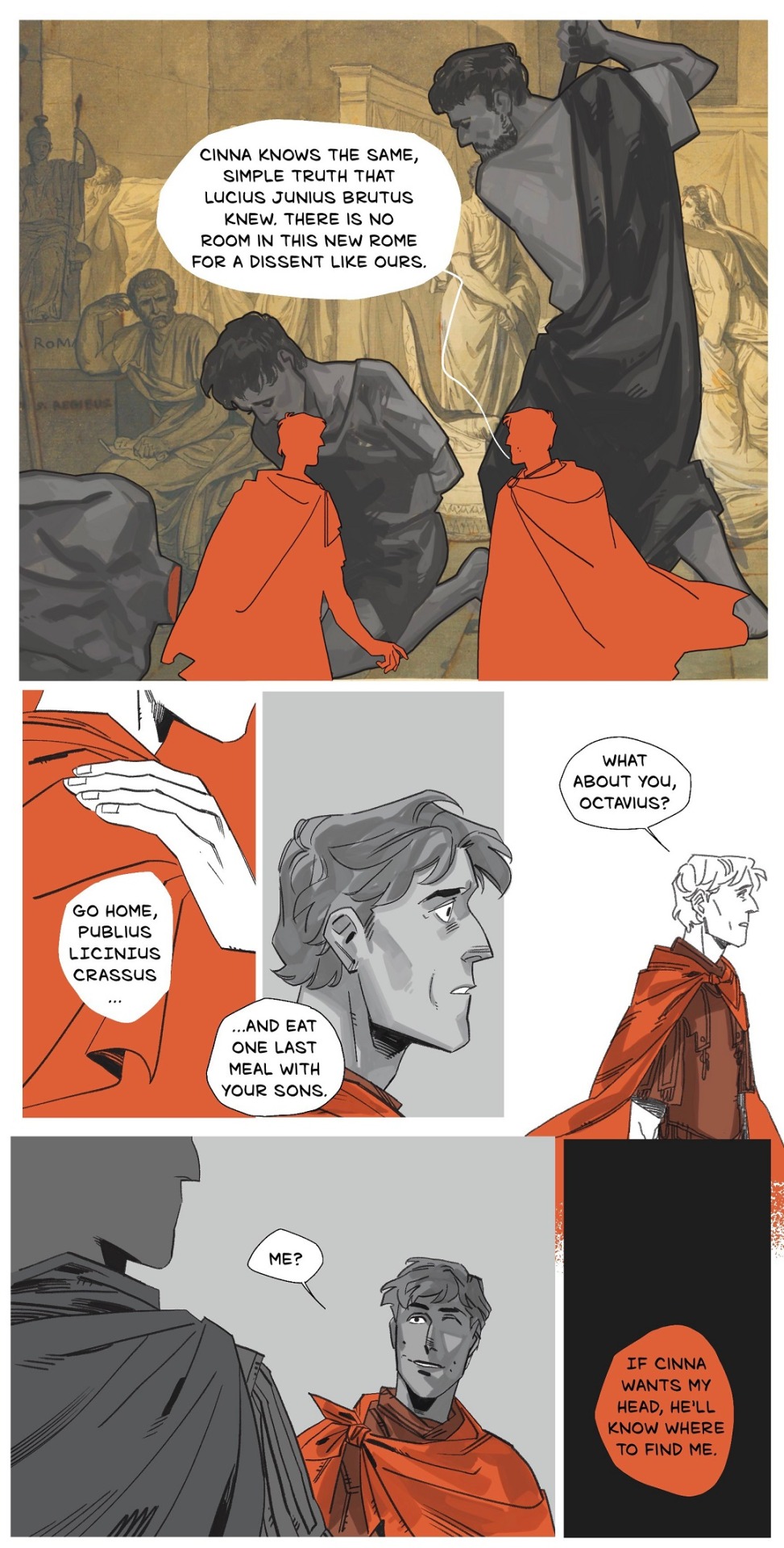
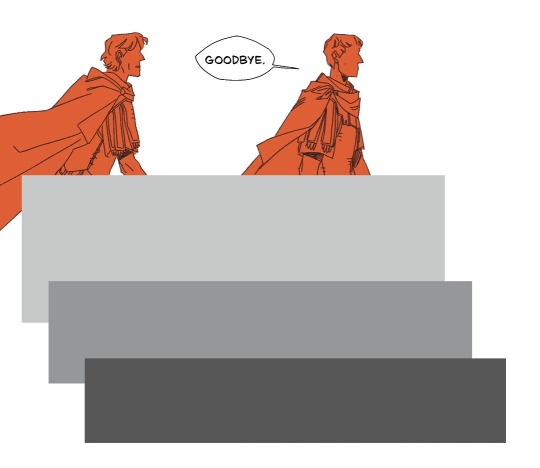
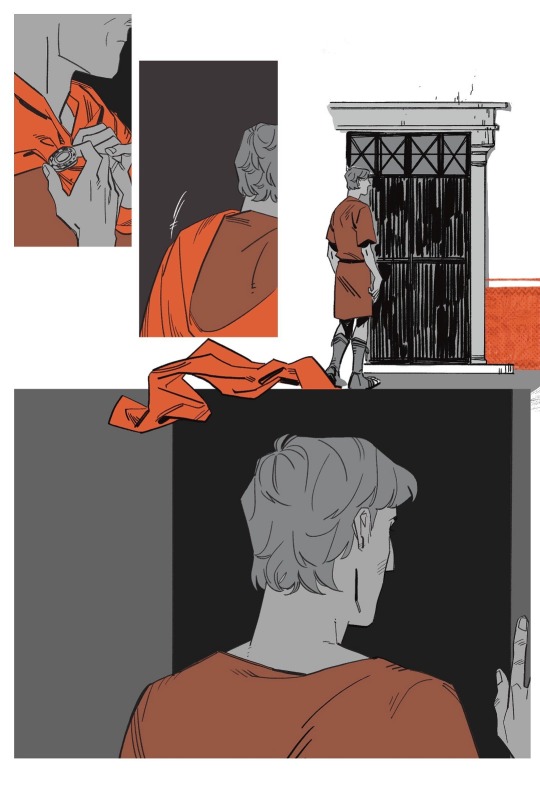
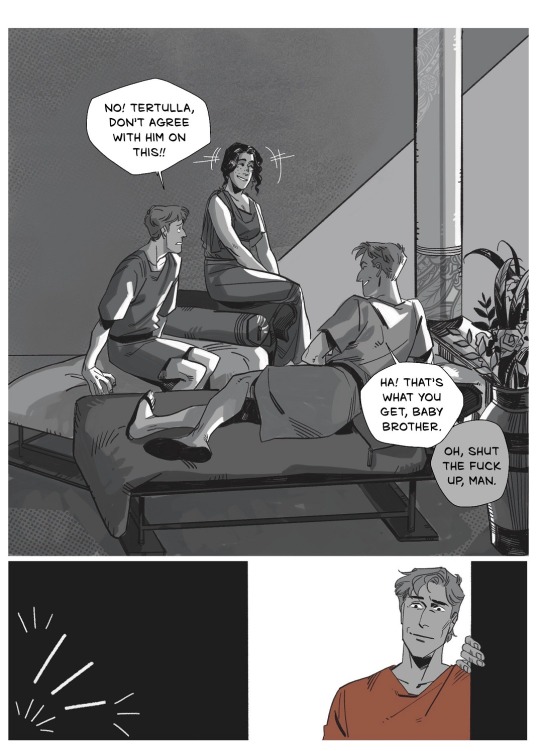
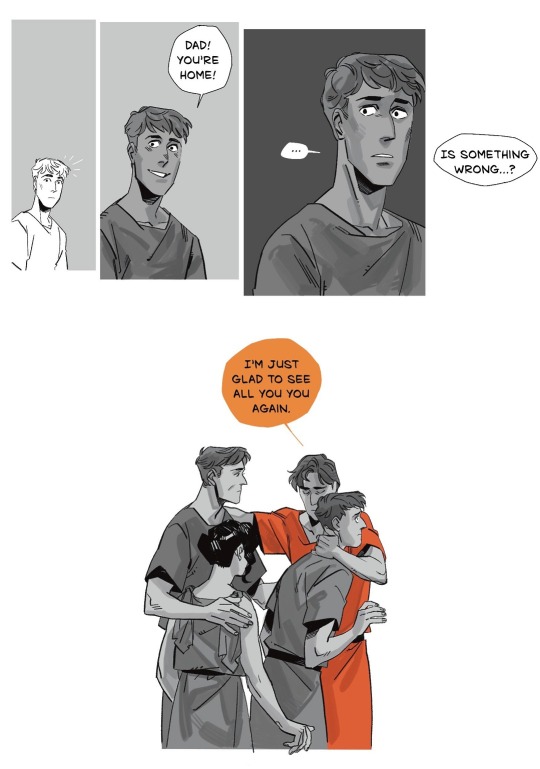
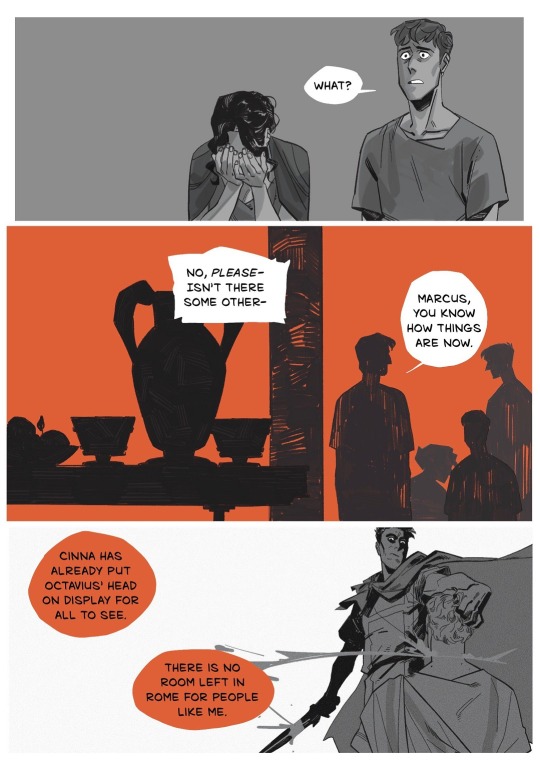
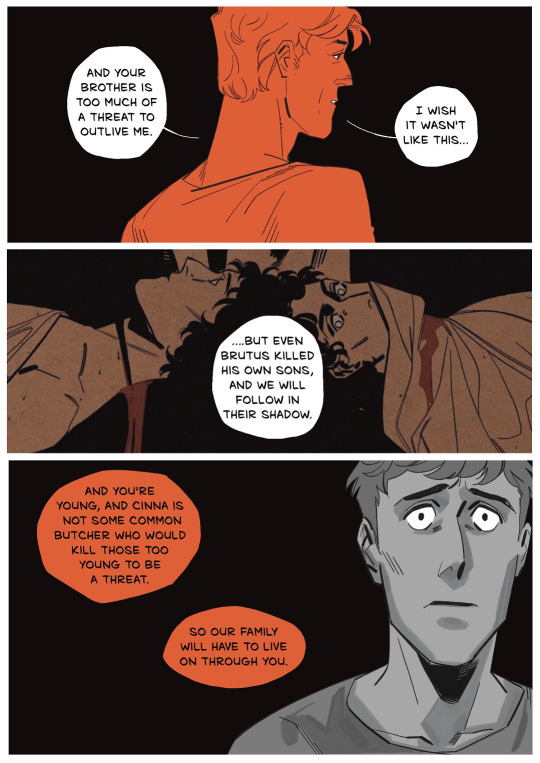
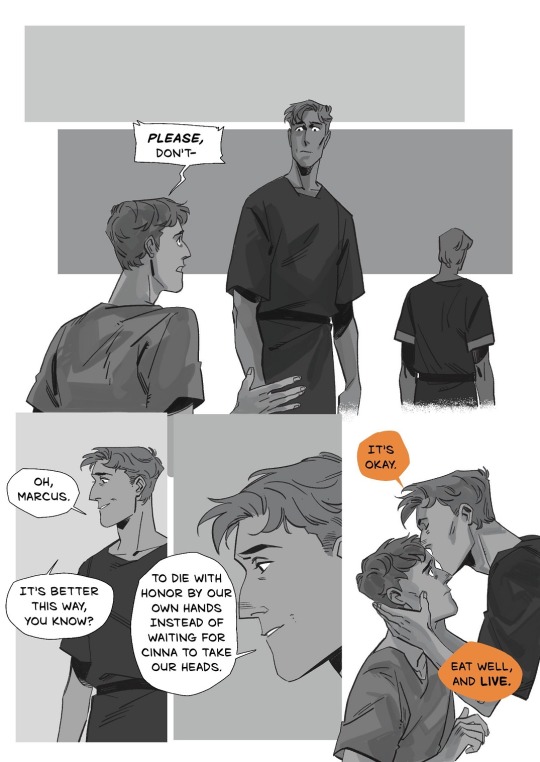
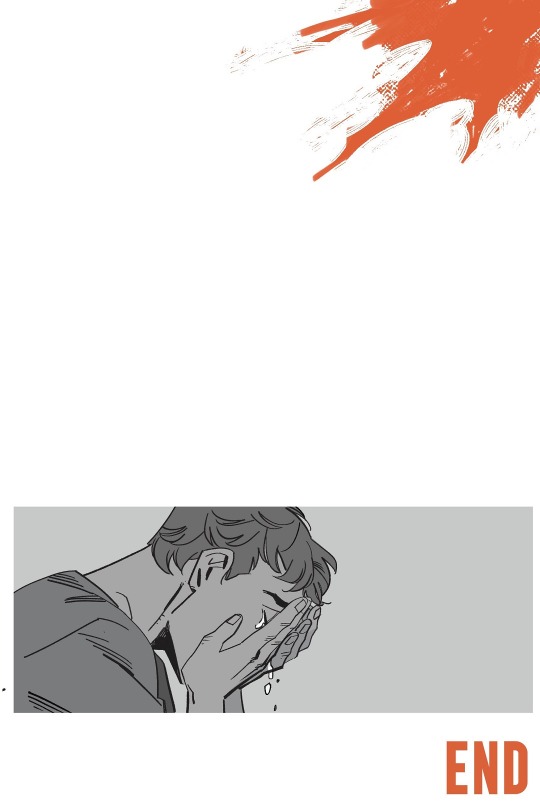
TRIKARANOS CHAPTER I: S·T·T·L
TRIKARANOS is a comic about Crassus until it isn't. Intended for an adult audience.
⭐ Trikaranos will always be free to read. In the near future, you’ll have the option to support this comic & my ability to spend time making it (I Am Extremely Fucking Broke And Have Bills To Pay etc etc) through Patreon! currently, I have a tip jar!
⭐ There is no set update schedule (chapters vary in length and will be posted as I finish working on them)
⭐ alternative places to read it (coming soon!)
CREDITS all additional art used are in the public domain, and the specific images used are open access, etc
🍊the first collage panel is combination of: Plate 113: Greeks Battling the Trojans (from Ovid's Metamorphoses), Antonio Tempesta / The Trojans pulling the wooden horse into the city, Giulio Bonasone (after Francesco Primaticcio) / Terracotta hydria displaying Achilles waiting to ambush Triolos and Polyxena 🍊the second collage panel is: The Lictors bringing Brutus the bodies of his Sons, Jacques Louis David / the paint over of Brutus executing is own sons is my own work based on the composition of this relief of Brutus and condemning his sons to death. 🍊I also used my own art: a panel from the Prologue, and my own illustration of Brutus with the bodies of his sons
📖 PREVIOUS CHAPTER | START HERE | ToC (under construction!)
UNDER THE CUT creator’s commentary, ancient citations, whatever else seems relevant. ideally, this is optional! you shouldn’t need the citations for it to make sense as it unfolds since it’s a comic and a story first and foremost, but it’s here if you’re curious about something or want to see where the inspiration is coming from!
I'm so fucking normal about Crassus and his family (<<< this is a lie)
Marcus Crassus was the son of a man who had been censor and had enjoyed a triumph; but he was reared in a small house with two brothers. His brothers were married while their parents were still alive, and all shared the same table, which seems to have been the chief reason why Crassus was temperate and moderate in his manner of life. When one of his brothers died, Crassus took the widow to wife, and had his children by her, and in these relations also he lived as well-ordered a life as any Roman.
Plutarch, Crassus
like, it actively fucks me up that this is something that's survived about him for over 2,000 years. they all ate together at the same table. Jesus Christ.
so! Crassus' dad! Publius Licinius Crassus (consul 97) fought on the side of Cn. Octavius (consul 87) in the Bellum Octavianum, and it didn't go great for him.
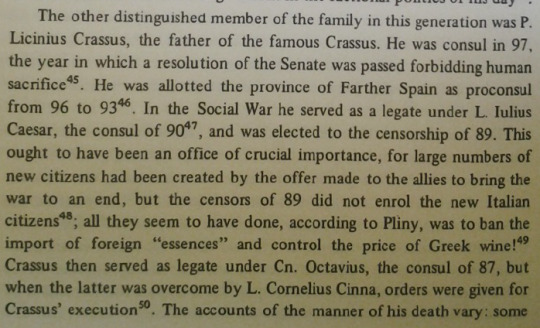
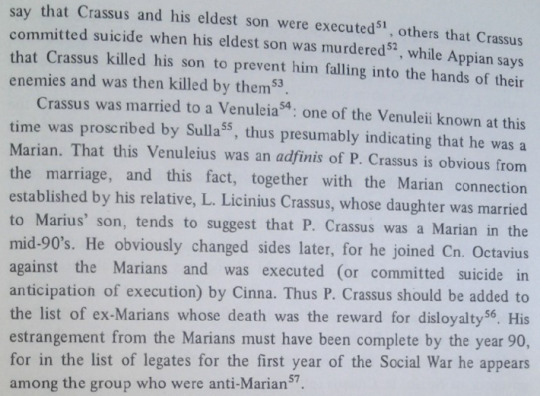
Crassus: A Political Biography, B.A. Marshall
also. currently, if you look Publius Licinius Crassus up on wikipedia for an overview, his page lists his son (and also my main character for this comic) with the cognomen Dives, which is in-fucking-correct.

Marcus Crassus and the Late Roman Republic, Allen Mason Ward
and to circle back to houses and meals shared with family, some citations that made me feel some kind of way when I read them


Marcus Crassus and the Late Roman Republic, Allen Mason Ward
finally, there is discourse or whatever on the placement of the sons of Publius Licinius Crassus. Crassus is the baby brother here simply because I'm writing this story and I get to pick the themes, but also because no one has provided a solid enough argument for him being the second eldest son that I'm willing to buy into with enthusiasm, and I'm more inclined towards G. Sampson's conclusion on the matter.


Defeat of Rome: Crassus, Carrhae, and the Invasion of the East, Gareth C. Sampson
and while I'm just kind of talking about stuff that I read that I enjoyed, this article by Martin Stone lives in my head rent free

A Year of One's Own: Dating the Praetorship of Marcus Crassus, Martin Stone
#trikaranos the komik#hehghghh HELLO i'm back. oof. hgh#if i think too much about them as a family i take critical damage to my hit points
643 notes
·
View notes
Text
To Take Away it's Pain
Luis Dante ⋆˙⟡ - for @justanothermemestrider
my very very late half of a writing trade! i am so sorry this took 3 months and may feel rushed, college paired with physical therapy and writers block is a deadly combo.
being the wife of the chapter master is no easy task, especially when your husband goes silent for days on end. after consulting dante's closest consul and finally finding her husband, dante must confess to his days-old hidden secret.
word count: 1.6k
warnings: trigger warning mephiston, red thirst and general 40k stuff

“And you’re sure, lord Mephiston?”
“Certain.” The lord of death replied, making it near obvious that he paid no mind to her concerned gaze. Her eyes remained fixated on the cascading crimson robes that adorned his lower half, or the way they flowed like a fountain of blood from his waist as he paced around his quarters, eyes closed, mind deep in thought. “I do not tell you this to bring you fear, just in hopes that you exercise caution, and understand that you have a safe place within the librarius if things are to go wrong.”
She nodded her head in agreement before her eyes met the floor instead. She sat perched atop Mephiston’s desk, quiet and still, for she had already spoken her piece to the chief librarian. He spoke very little, and the wisdom that fell from his lips spilled out in indecipherable riddles and in a jumble of accents she often asked him to repeat.
“I just don’t understand why he’s been so avoidant lately, Mephiston.” She spoke, finally finding the courage to cut the tension in the air. “He confided in you about something you’re not telling me. Please just tell me what’s wrong with my Dante. I am afraid.”
The lord of death shook his head. “It is not my place to tell you of things I have been trusted with.” he replied and watched her face contort into clear disappointment, perhaps anger. “But I can tell you that he is afraid too - of how you will feel when you know the cause of his recent… irritation.” said Mephiston with the slightest of smiles across his face.
His fangs very slightly peeked from behind his lips when he smiled. Beautiful, genuine, and dangerous all the same. It would be a lie to say that the chief librarian did not make her just as discomforted as he did Dante, yet her frustration toward him grew greater than the gnawing feeling within to avoid snapping at him.
“I need you to tell me what you know about Dante. I command it.” She spoke as she slid down from her sitting position on his desk. Her tone had become more hardened, her eyes narrow and her shoulders held in perfect noble posture. She tried to appear larger, to show her authority as the chapter master’s beloved, to show that she was not afraid; a façade that came crashing down the moment Mephiston stepped closer to match her display of command.
He kneeled to her height and cocked his head to the side, clearly amused by her attempt at standing up to something powerful beyond her comprehension. “Do not forget you are in my librarius, little angel. Dante has little command here.” His hair fell over his shoulders as he leaned down to her height, his face mere inches away from hers, eyes illuminated a gentle blue. She held her expression despite her hummingbird heart pounding in her chest. Whether it was from fear or genuine determination was his knowledge and his alone, a feeling not even her pitiful human mind could comprehend.
He pulled away from being so close to her after a few moments, satisfied with her lack of willingness to back down. “He is in his quarters, if I transport you there myself you can catch him before he attempts to flee again.” said Mephiston as he opened a small window into the warp with a wave of his hand, the elaborate door to Dante’s personal quarters a clear image a mere few feet into the portal.
She stared in awe at the window for a few moments before she turned to thank the lord of death, and yet the moment she met his gaze he had grabbed the back of her robes and tossed her through the portal with little effort. She landed on the opposite side with a soft thump, and the portal slammed shut behind her, the image of Mephiston on the opposite end faded with it. Impatient he was, as always.
She sat at the door to the Lord Regent's quarters and stared down at her hands for a moment before curling her fingers into fists and inhaling a deep breath. "I can do this," she told herself, expression filled with an incredibly calm determination. "Just have to talk to him."
She did not allow herself a moment of doubt before entering Dante's quarters, a place she treated as unfamiliar even though she too slept there each time she needed a place to rest. Dante himself sat on the edge of his massive bed, noticeably shocked at his wife's sudden intrusion and even more shocked she knew where he was after he had so carefully watched her daily routine and made sure it hadn't aligned with his over the past few days.
"My love..." He spoke, excited for a moment before he urgently buried his face in his hands and covered it, seeming to remember he had a dire secret to hide. "How did you know I was-"
"The Chief Librarian and I spoke. He tells me you aren't telling me something."
Dante flinched slightly, clearly taken aback by her incredibly harsh tone. She did not hesitate when it came to interrupting her husband's rather irrelevant questions. According to the lord of death, he had been hiding information from her for days. He could afford her at the very least a few moments of her own secrecy.
He would be a complete fool to assume his own wife was not suspicious of his hands covering his visage. A part of her softened at the sight of him shying away from her as if he were a dog that had been cornered, fearing punishment if it looked its accuser in the eye.
"Dante..."
Her facade of anger came crashing down around her the moment she heard the slightest of sniffles coming from the chapter master followed by what seemed like an endless slurring of explanations and apologies. "Don't look at me... I'm sorry... I didn't want to..." He wept gently into his hands, and yet not a single word told his wife the full truth she was after.
“My angel… what did you- “
“Blood… living blood…” He murmured as he buried one hand further into his face and gripped at the sheets of his bed with the other. His knuckles turned an incredibly pale white at the strength of his grip. “My oath… I…”
Dante finally allowed his tears to flow freely, and his wife simply stood still in front of him. She watched his chest rise and fall with sobs, and eyed at the bleeding claw marks in his arms left by none other than his own fingernails, likely something he felt was a much-deserved act of self-penitence.
"You are saying that you took living blood, Lord Dante?"
He stiffened under the use of such a title from his own wife, as if it were not one he heard at each moment of each day. Even in spite of his evident fear, he curled in on himself further and nodded frantically.
"Please," He whispered, his voice weak and muted underneath persecution - the consequences of his actions. "Forgive me."
Silence hung heavy in the air for more than a few insatiably uncomfortable moments. Dante's wife did not dare to speak underneath the weight of the realization that her husband had become weak, and Dante did not dare release his body from the position of one of old terra's aquatic crustaceans, lest she have to meet his eye.
The chapter master was almost certain that this matter meant divorce for him.
Not only had he hidden a great secret from his wife, but he had broken a centuries-old oath that would surely tarnish his reputation in the face of many, beginning with his chief librarian and beloved wife.
And yet, the very second he felt he were going to finally curl up and die, her laughter filled the room like a sudden and gentle symphony meant only for his ears. Not composed or pompous chuckles meant to impress for diplomacy, but genuine and heartfelt laughter. The shock alone was enough to catch him off guard and bring his sunken eyes to meet her form as she sat down next to him, her eyes filling with tears as her giggles failed to find any restraint.
"You hid from me over something so small?" She struggled to catch her breath. "Oh, oh forgive me my love. It's just that-"
"You are laughing..."
Dante tilted his head to one side as she took his face into her palms, meeting his eyes with her own and giving him a smile so soft he nearly forgot he had exsanguinated a baseline to the point of death.
"I could never hate you over something so small. You have been alive for a dozen lifetimes, tending to your own needs is not selfish, especially when what you need is freely offered."
Dante felt the grip of guilt release his mind ever so slightly and took a deep, shuddering breath before nodding and releasing his bodily tension as much as he physically could. He met his wife's smile with his own to the very best of his ability and allowed her to crawl into his lap. She settled on placing her stomach against his thighs, lying face down across his crossed legs, effectively trapping him sat on his own mattress as he rubbed gentle circles into her back, releasing short, silent, sob-filled breaths as days worth of emotional tension tied to a secret he had far overestimated fell from his cracked lips.
"No more hiding," She proclaimed, teasing and yet commanding. "I want you here when I wake from my sleep, this time."
Solspina's Scribellum✎ (❁ᴗ͈ˬᴗ͈) ༉‧ ♡*.✧
@astrohymn @moodymisty @undeaddream
@kit-williams @lemon-russ @egrets-not-regrets
@justeverythingnothingelse
(please comment to be added/removed from my taglist !!)
109 notes
·
View notes
Text
"Forced Lent. The Syrian people did not have to wait for Lent to arrive, their lives are already filled with austerity and daily sacrifices.
For 13 years now, our families are living a forced Fasting which is becoming heavier each day, that seems like an endless Calvary.
No heat for the elders, already made fragile by the cold winter, no baby milk for the newborns, a shortage of many medicines aggravating sicknesses and illnesses, extreme poverty. Those are the conditions leading to the death of many.
Once viewed as the hope of the future, the young generation is suffocating and desperate. Poverty, lack of jobs, impossibility to start new families, impossibility to apply for visas and leave the country as consulates are shutting down, eliminating thus their last hope. A total blockade with devastating sanctions.
Facing all the above, many are desperately searching to leave, even at the risk of losing their life by drowning on one of those refugee boats.
Isn't all of the above a form of forced euthanasia that is slowly and surely being imposed on that poor and deprived population?
Let us entrust our concerns to Our Lady of the Resurrection."
Samir Nassar, Maronite Archbishop of Damascus, Lent 2024 On the third day of Lent in the Maronite calendar (Feb 15), the US House passed a bill expanding economic sanctions that contribute to the starvation of the Syrian people.
600 notes
·
View notes
Text


damnatio memoriae: PART VI
In the Roman world, damnatio memoriae was used to describe a range of actions taken against former leaders and their reputations. These actions included: defacing visual depictions, removing heads from public statues, chiseling names off inscriptions, and destroying coins.

summary: reader, who goes by 'Prima', was raised by a powerful Roman consul, under the reign of Imperator Septimius Severus. When it comes time for his eldest son, Caracalla, to marry again, a chain of events is set off, changing the course of Prima's life and the lives around her.
⟡ ⟡ ⟡ ⟡ ⟡ ⟡ ⟡ ⟡ ⟡ ⟡ ⟡ ⟡ ⟡ ⟡ ⟡ ⟡ ⟡ ⟡ ⟡ ⟡ ⟡ ⟡ ⟡ ⟡
warnings: major character death, crucifixion, rough sex, swearing, mentions of menstruation, ancient Rome as a warning in itself, read previous warnings.
notes: I am posting this at 2:57 AM EST. I had no intention of posting this today or touching this fic, but I have written 6 different variations of this chapter alone and finally weaved them all together the way I liked. This has not been beta'd at all so please forgive any mistakes. I argued with myself about making this chapter smuttier just for my reader's pleasure and what not, but the plot outweighed the horny this time. Once again, this fic is a labor of love and really has pushed me to become a stronger writer. I can tell that my style is changing and evolving, so thanks to everyone who has pushed me to keep going. This has almost been like therapy.

VI
The road to Rome stretched before you like a serpent, winding through the countryside and coiling as the company rode without slowing. The rhythmic pounding of hooves against the packed dirt was the only sound filling the tense silence between you, Caracalla, and Geta. The heat of Caracalla’s body behind you was grounding, his arm wrapped around your waist in a firm grip, as if he sensed you might slip away into your thoughts if he let go.
Geta rode beside you, his posture rigid, his face unreadable. The tension between the brothers was palpable, taut like a bowstring ready to snap. You felt the weight of their unspoken words pressing down on you, suffocating in its heaviness. But you were not thinking of them. Your mind was elsewhere—on what you had left behind in Baiae, on what waited for you in Rome, and on the bitter taste of something you had not yet named.
Surrounding you were the Praetorians, their polished armor gleaming under the midday sun, their silent presence a constant reminder of the power that enclosed you on all sides. Their formation was tight, disciplined, ensuring that no one, whether from ahead or within your own group, could act without consequence.
It wasn’t until the outskirts of Baiae came into view that unease settled deep in your bones. You had not expected such a crowd as you passed through. The streets were unusually dense, the hum of voices growing louder as you entered. A slow dread curled in your stomach as you took in the gathered masses, their eyes fixed on something ahead. The murmurs were thick with cruel delight and hushed horror.
The horse beneath you slowed as Caracalla pulled on the reins, a low chuckle vibrating from his chest. “Ah,” he murmured, amusement lacing his tone, “Baiae always loves a spectacle.”
At first, it was just a shape against the sky, something out of place in the sea of bodies. Then the sun glinted off gold—bracelets, delicate and familiar, still clinging to limp wrists. Dread rooted itself deep in your stomach as realization struck.
There, raised high above the crowd, was a cross. And nailed to it, her body battered, her golden bracelets still glinting in the harsh daylight, was Prosperina.
The world constricted, narrowing to that single point of horror. The delicate curve of her throat now bore the grotesque bruises of strangulation. Her lips were parted in eternal silence. The silk of her stola was torn, stained with blood that had long dried in the heat of the sun.
You barely registered the way Caracalla’s fingers tightened against your waist, or the low murmur of the crowd. The only thing you could hear was the rushing in your ears, the sharp thrum of blood pounding against your temples.
Geta’s voice, quiet yet sharp, cut through the haze. “You look pale, Prima.”
You swallowed hard, your nails digging into your palms to ground yourself. “I did not expect such a… crowd.” Your voice was steadier than you felt, but even that small victory felt hollow.
Caracalla’s lips brushed the shell of your ear, his breath warm and thick with something unreadable. “Fitting, isn’t it?” he murmured. “She should have known better. You do now, don’t you?”
A tremor ran through you, though you masked it well. The weight of his words was heavier than the bodies they strung up for sport. You forced yourself to turn, to meet his gaze with something softer than defiance, though the battle within you raged hotter than ever.
“I do,” you said, voice quiet but firm.
His smirk softened, but he said nothing more.
The horse continued forward, but your mind remained rooted to that cross, to the woman who had, for a brief moment, shown you something outside the prison of power and control.
As the procession moved through the streets, as Baiae faded behind you on the road to Rome, you knew something had shifted, something within you now lost—dead, like the woman left hanging in the sun.
____________________________________________________________________________
The gates of the imperial palace groaned open just before sunrise. The courtyard stood empty, silent, and dark, the usual watchful presence of stewards and servants absent. No warm towels, no priestly incense, no wine. Just shadow and the faint scent of oil burned low in the sconces.
You dismounted without assistance, your hands steady as they gripped the saddle though every movement pulled at the flesh along your spine. The bandage there had begun to stiffen, tugging each time you shifted, a constant reminder of what had happened—what had been taken, and what had been allowed. Your sandals struck the ground with more weight than grace, and you straightened slowly, letting the pain sharpen your focus as you adjusted your cloak around your shoulders.
Caracalla said nothing as he passed beneath the archway ahead, his stride even, his guards flanking him in tight formation. He did not glance back. He hadn’t looked at you since Prosperina. Geta lingered behind the procession, his mount moving at a slower pace, his posture upright but not tense. His eyes moved across the palace walls, the dark windows, the empty balconies, watching, calculating, but not speaking. When his gaze fell on you, it stayed there.
You crossed the threshold last, stepping beneath the arch into the quiet weight of the palace. Once, this place had felt like a stage—alive with light and movement, voices echoing through marble corridors, laughter tucked into every shadow. Now it held the stillness of something recently abandoned. The torches flickered low and uneven, their flames too faint to chase away the gloom. You could smell old smoke, dust, and the faint rot of laurel leaves gone brittle.
Nothing had changed. But something in the air whispered that everything had.
Your footsteps echoed in the silence, a sound too loud in a space that used to absorb it. You felt eyes on you—servants tucked into doorways, guards watching from behind columns, the unseen murmur of slaves pressing themselves into corners, all of them waiting for the measure of what had returned. You said nothing. You met no gaze. You walked slowly, each step purposeful, letting your silence speak for you.
When you reached your chambers, the guards stationed there snapped upright, too quickly, as if your presence had startled them. Neither spoke. One inhaled sharply and didn’t release the breath until you dismissed them with a single word. They bowed—not deeply, not confidently—and stepped back into the shadows, grateful not to be summoned further.
The door closed behind you with a soft thud that felt heavier than it should have, sealing you inside a room untouched since you left it. Everything was as it had been. Your robe hung neatly behind the changing screen. A scroll lay open beside the chaise, its parchment curled at the edges. For a moment, you simply stood there, letting your eyes move across the space, cataloguing the unchanged. A strange stillness settled in your bones, as if you were no longer sure whether this room belonged to you, or if you had returned to it too changed to belong anywhere at all. You didn’t reach for the lamp. You didn’t undress. You only peeled back the poorly wrapped bandage and studied your palm.
The wound had stopped bleeding, but it was far from closed. The gash ran diagonally across the softest part of your hand, shallow but angry, pulsing faintly with each beat of your heart. It had been carved clean, and though you had bound it tightly with linen, the wrap had grown damp with sweat and the faint trace of blood that still seeped through.
You flexed your fingers slowly, testing the skin. The pain was sharp, but not unfamiliar. It wasn’t the first time you had bled for someone else’s power, but this time, you had drawn the blade.
You moved to the chaise, lowering yourself with more care than grace. Each shift in weight pulled at your back. The bandage you’d wrapped there before leaving Baiae had begun to tear away from the wound. You could feel it loosening beneath the fabric of your shift, the blood that had dried into the cloth threatening to pull again with every breath.
You didn’t call for assistance. You hadn’t since you returned. There would be no one to see you undress, no one to lay out clean robes, no one to scrub your fingernails. That, too, had been intentional.
The knock came only once before the door opened.
The healer entered without ceremony, without hesitation. She was older, her skin darkened by years of sun and work, her frame lean and steady. A long scar crossed her jaw, but her hands were clean and bare. She carried a basin of water, steam curling upward, and a folded cloth tucked under one arm. She did not speak. She did not bow.
You said nothing as she crossed the room and set her things beside you. She did not ask where the wound was. She simply moved behind you, lifting the hem of your cloak, then your shift, and found the bandage.
You had done your best with it, but it had slipped out of place during the journey. Her fingers worked quickly, unwinding the fabric, peeling it free from the broken skin beneath. The salve you had used was nearly gone, the cut reopened from the motion of riding. You inhaled through your nose and held still. The cloth pressed against your back, soaked in vinegar and lavender, stung sharply. You didn’t flinch. Her touch was practiced and methodical.
You remained seated for what could have been minutes or hours. Time stretched strangely in the hush that followed. The cloth beneath you had begun to cool, clinging faintly to your skin, when the healer, who had not yet left, cleared her throat softly.
Without waiting for your response, she moved toward the adjoining room, gesturing with a subtle flick of her fingers.
“Come,” she said, not unkindly.
You rose without speaking.
The air in the balneum was warm and heavy, scented with steam and oil. The water in the sunken bath shimmered faintly, moving only by the slow, steady trickle of a fountain built into the far wall. Steam curled from the surface, catching in your throat with the faint sting of rosemary and crushed mint.
The healer moved without commentary, setting down her basin and cloth on a low bench before stepping to the edge of the water. She reached for a slender bottle of warmed oil and poured it slowly into the bath, the surface blooming with a slick sheen.
You untied the sash at your waist and let your shift slip from your shoulders, allowing it to fall to the floor without ceremony. She did not avert her gaze. She had seen bodies broken before—this was simply another kind of ruin.
As you stepped down into the balneum, the warmth enveloped you immediately, rising to your thighs, then to your waist. The ache in your muscles softened, only slightly dulled by the heat. You sank into the water until it covered you up to your chest, your elbows resting on the smooth ledge at either side.
The healer knelt beside the bath, wetting a cloth with the steaming water. She didn’t ask permission. She began with your shoulders, then your neck, dipping the cloth again and again, scrubbing the remnants of dried sweat, blood, and travel from your skin.
When she lifted your arm, her breath caught for only a second.
The bite mark there had darkened overnight. Bruises ran in parallel lines down the inside of your arm—grip marks, unmistakable in shape and intent. She did not ask questions. She dipped the cloth again and moved to your side, where the worst of it lay.
Your skin told the story: across your ribs and hips bloomed the handprints of possession, bruises deep and uneven, the imprint of knees, knuckles, teeth. The lash mark on your back-- a gift from Caracalla’s whip– ran like a line of red ink beneath all of it, angry and swollen, and had barely been held together by the fresh bandage.
She traced a cloth along the curve of your spine, carefully avoiding the wound. Then she tilted your chin gently upward to wash your face, the only moment of softness in the entire exchange.
“Tell me,” she said, not sharply, but with the steadiness of someone accustomed to damage.
You opened your eyes and met hers.
“What would you have me say?”
Her expression didn’t change. She dipped the cloth again and began to clean your hand, the diagonal gash now swollen, the edges faintly pink.
“This one was your doing,” she said quietly, wrapping her hand lightly around your wrist.
You didn’t answer.
Her thumb brushed a smear of dried blood from your palm. The heat from the water brought the sting back to the surface. You held still, letting her work.
Once she finished, she poured a ladle of warm water over your shoulders, letting it run down your back, over your thighs, between your legs. She did not look away. She was not here to pretend. Her fingers found a spot at your side, near your hip bone, where the bruises had layered over each other in a wash of purple and yellow. Her touch paused there.
She didn’t speak.
Neither did you.
When she finished washing you, she retrieved a soft cloth and motioned for you to stand. You did, slowly, water cascading from your skin in thin rivulets. She dried you without comment, beginning with your arms, then your legs, moving around your body like a ritual performed too many times to need instruction.
At last, she said, “There are places they strike where the bruises fade quickly. Yours will not.”
You nodded, the ache behind your eyes sharp and steady, but no tears came.
“I know.”
She took one final look at you—naked, marked, upright—and then turned from the bath, speaking only once more as she reached the door.
“Someone should see what Rome does to its daughters.”
The door shut behind her, and this time you truly were alone.
The warmth from the bath clung to your skin, but it couldn’t reach the cold settling in your chest. You moved slowly to the marble bench, wrapped the drying cloth tightly around your shoulders, and sat. Your eyes flicked to your reflection in the dark water—distorted, distant, but yours.
You weren’t thinking about shame.
You were thinking about how blood keeps score.
And how long it might take for the empire to answer for yours.
____________________________________________________________________________
Rome did not welcome you back. It endured you.
By midday, the palace had resumed its rhythms—or appeared to. Bread was baked. Bronze was polished. Scribes whispered over scrolls. But something vital had gone missing in your absence, and whatever remained behind smelled faintly of rot masked with perfume.
The silence was heavier here. It did not serve as awe but as insulation—thick, padded, suffocating. And those who moved within it did so carefully, as if afraid to wake something sleeping beneath the marble.
Your footsteps echoed where once they would have been muffled by murmuring courtiers. You passed no one in the colonnades, no senators trading favors in shaded alcoves. Even the priests walked lighter than usual, their vestments trailing behind them like funeral cloth.
Word had traveled faster than your horses. You saw it in the way the servants looked away when you passed, in the way the guards stiffened—shoulders too tight, hands a breath too close to their swords. You heard it in fragments from behind curtains and in the dry coughs of those who pretended not to see you.
They didn’t know what had happened in Baiae. But they knew something had.
And more than that, they were watching to see how you’d carry it.
You were dressed in dark linen bound with a thin gold sash at the waist, the fabric carefully chosen to obscure the worst of the bruising along your hips and arms. Cassia had helped you braid your hair back from your face in a style too severe for mourning but far too austere for court. It sent a message. You hadn’t come back soft.
The hall leading to Septimius’s quarters had once been a place steeped in lore and legacy—lined with oil lamps and veiled attendants, always humming with the quiet urgency of those who waited for the voice of a god. Today, it felt like a tomb.
No guards stood outside the door. Only a single servant boy sat on the floor beside the arch, nodding off in the warmth, his tunic wrinkled and damp at the collar. When you approached, he startled upright and scurried away without speaking.
You entered without being summoned.
The air inside was thick with incense and decay. The curtains had been drawn back slightly to allow the afternoon light to filter in, but it did little to soften the room. A copper basin sat unused beside the bed, the cloths inside it already stained. Flies hummed near a bowl of half-eaten dates on a table that had once held treaties and letters from distant provinces.
And there, in the center of it all, lay Septimius.
The emperor. The imperator. The father of Rome.
His body had shrunken beneath the linen blankets, the shape of his frame no longer divine but withered, as if some greedy thing had already begun to feed on him from within. His skin was the color of parchment left too long in the sun. His lips were cracked. A faint wheeze rattled in his throat with each shallow breath.
He did not notice your entrance. Or if he did, he gave no sign.
You stood at the foot of the bed for a long moment, unsure whether to speak. There was no court here. No audience. Just you and the dying breath of a god who had once moved nations with a glance.
Then, without opening his eyes, he spoke.
“I know that walk.”
His voice was paper-thin, barely audible, but it scratched through the stillness.
“I heard it once… in my mother’s house, just before the storm hit Antioch.”
You said nothing.
He turned his face slightly toward the sound of your breath, his eyelids fluttering open just enough to expose the bloodshot blue beneath.
“I thought you were her,” he whispered. “Or the other one. The dead one.”
You stepped closer.
“I’m none of them,” you said.
“No,” he rasped. “You’re what’s left.”
A long pause. Then, with startling clarity, his voice sharpened—not in strength, but in tone.
“They were my balance. And now they tilt the world.”
He blinked slowly, his gaze going glassy again. His hand moved under the blanket, weakly fumbling for something—perhaps for the past, or for a name he couldn’t quite recall.
“One sun rises…” he murmured. “One must fall.”
You stood still, your arms at your sides, the cloth of your robe suddenly too heavy across your shoulders.
“The gods mock me,” he said softly, almost dreamlike. “I made them emperors… and they make war within their own walls.”
His head turned toward the window, the faintest trace of light gilding his temple. For a moment, it was possible to see the man he had once been—the marble-cut silhouette, the fury, the mind. And then it passed.
His eyes found yours again, focused for the first time.
“You… you are my weapon The clever girl they say will outlive us all.”
Then he blinked once more, and the recognition faded.
He drifted back into silence, the breath in his chest shallow, the sound of it barely distinguishable from the rest of the still room. You stood there longer than you meant to, watching the rise and fall of the blanket over his chest, wondering how long it would continue. Wondering who would be the first to stop pretending that Rome was still being ruled at all.
____________________________________________________________________________
You didn’t return to your chambers after leaving Septimius.
Instead, you walked the eastern colonnade, where the light was thinner and the arches opened onto the inner garden. The breeze moved through the cypress leaves in slow spirals, rustling the ivy along the carved stone pillars. It had once been a place for midday gatherings, performances, quiet conversations about music and law. Today, it was empty.
Or so you thought.
You had just rounded the corner, the hem of your stola brushing against cool marble, when you heard voices ahead—quiet, controlled, just beyond the curve of the wall. You slowed.
One voice—measured, low, unmistakable.
Macrinus.
“I do not believe in omens,” he said, his words carrying in the stillness. “But I do believe in patterns. And Rome follows them as surely as blood follows the blade.”
There was a pause, then the quiet rustle of someone shifting their weight.
Geta’s voice followed, cooler, more restrained. “And what pattern do you see now?”
You stepped back into the shadow of an arch, letting the folds of the stone wall swallow your form. The corridor ahead twisted gently, a sculpted bust of Juno obscuring you from view. From where you stood, you could see neither man—but you could hear them clearly.
Macrinus spoke again, his tone almost casual.
“Two emperors. One fading. One fracturing. The court divides itself like a carcass under knives. And the lady? She returns cloaked in silence, and everyone steps back as if she carries fire.”
“She carries something,” Geta replied. “Though I haven’t yet decided what.”
A soft laugh from Macrinus.
“She carries the memory of Baiae. That is enough.”
There was a stretch of quiet between them, broken only by the sound of water trickling in the distance.
“You think her dangerous?” Geta asked.
“I think she is still breathing,” Macrinus said. “And in this palace, that makes her dangerous enough.”
More silence.
Then Macrinus added, “He’s unraveling, you know. Our beloved Augustus. Rome sees it. The senators see it. Even the gods must be tired of watching him clutch the empire like a spoiled child refusing to share.”
Geta didn’t respond.
“You could have it,” Macrinus said softly, not a whisper, but something close. “With the right voices behind you. The right faces at your side. Even the right silences.”
There was a long pause before Geta finally spoke again.
“I’m not in the habit of collecting poison in exchange for power.”
“No,” Macrinus said. “But sometimes, poison is the only thing sharp enough to cut through rot.”
You felt something tighten in your chest—not fear, not quite. Something sharper.
There was movement then—footsteps shifting, the echo of a sandal against stone.
“You’ve said enough,” Geta murmured.
Macrinus replied, “Only because you let me.”
The sound of their footsteps retreated in opposite directions, and the space between them stretched once more into silence.
You waited until you could no longer hear them before you stepped from the shadows.
The garden beyond the colonnade was still, the breeze faint. In the space between one heartbeat and the next, the empire tilted just slightly off its axis, and you, tucked inside its heart, stood still as marble, listening to the silence where power had just passed.
_________________________________________________________________________
You had not summoned him. You hadn’t seen him all day. But the moment the doors slammed open, you knew who it was.
Caracalla stormed into your chambers with the force of a man who had not slept. His cloak was half-undone, one fastening swinging loose at his shoulder. His jaw was tight, his eyes wild, a flush rising under the skin of his neck.
You did not rise. You did not greet him.
He stopped only once the distance between you had disappeared, standing over where you sat, his breath sharp and uneven. His hands were clenched at his sides, his fingers twitching.
“They’ve begun invoking it,” he said, barely above a whisper, as if saying it too loud would make it more real. “The edict.”
You looked up at him slowly.
“The one my father signed,” he continued, voice cracking, “naming me and Geta as co-emperors.”
He let out a sharp, humorless laugh, too short to be real.
“A senator quoted it to me this morning. Quoted it, as if I needed reminding. ‘It is the will of the Imperator that his sons rule together.’ As if his will matters more than mine. As if I’ve already been replaced.”
You didn’t answer. There was nothing in your voice that would have softened this. Nothing in your silence that could have made it worse than it already was.
“They’re not even pretending anymore,” he snapped. “They speak Geta’s name in the baths, in the temples. They look to him in the council chambers. And they look at me like I’m the rabid dog my father failed to leash.”
He began pacing, his sandals scuffing softly against the marble, the weight of him heavy in the silence. He dragged a hand through his hair, fingers trembling slightly.
“And you,” he muttered. “You say nothing. You do nothing. You walk these halls like you don’t belong to me.”
You kept your voice level. “Perhaps because I belong to myself.”
He turned.
He was on you in an instant, crossing the space in three furious strides. His hand gripped your wrist, the one still wrapped, and then released it just as quickly to shove you back into the chaise. The cushions caught you, but it knocked the air from your lungs.
He followed, pressing down, his knee between your thighs, his weight sudden and possessive.
“Have you bled this month?” he demanded.
The words landed with more force than the shove.
“What?”
“Have you bled at all? Since we were married?”
You stared at him. “I don’t know.”
He didn’t believe you.
His hands were already at your waist, pulling at the sash, yanking the fabric aside. You didn’t stop him. You didn’t help him either.
“You don’t know if you’re carrying my heir,” he muttered. “You don’t know.”
He looked down at you, his breath ragged, the fear behind his anger beginning to rise to the surface.
“If you are—if you are—then I win. If you're not…”
He trailed off, hands trembling against your thighs.
“… then there’s nothing left.”
He pushed inside you with the desperation of a drowning man, his pace brutal, rhythm unforgiving. You felt the sting of it immediately—the pain layered over bruises not yet healed, the pressure where your body hadn’t recovered from the last time he’d taken you like this.
“Mine,” he said against your throat, voice harsh, fractured. “You’re mine. They can doubt me, they can whisper about Geta, they can quote edicts like scripture—but you, you will not be theirs.”
You didn’t cry out. You didn’t speak. You lay beneath him like stone.
“One empire,” he spat, hips slamming into yours. “Two heads. That’s what they say now. Like it's a prophecy. Like I’m already dead and he’s already ascended.”
He bit down hard on the curve of your shoulder. You turned your face away.
“Do you know what they'll do if I let them?” he growled. “They'll raise Geta on a dais and drag me behind him in chains. They'll offer him Rome with one hand and hand me the dagger with the other.”
He came with a strangled sound, half growl, half sob, collapsing over you. His weight crushed your ribs. His hand found your face, but you pulled away.
Stillness followed.
His breathing slowed. He didn't speak. You felt the heat of him slowly drain, the tension in his limbs unraveling inch by inch.
When he finally rose, he didn’t look at you. He pulled his cloak over his shoulders, fastened it without care, and walked toward the door.
He paused there, one hand resting on the frame, his back to you.
“I will not be erased,” he said quietly. “Not by the Senate. Not by my brother. And not by you.”
Then he was gone.
You lay still, every part of you aching, your breath shallow, your skin sticky with sweat and something else. You reached between your thighs and felt the wetness there. Not blood. Not yet.
But your stomach turned all the same.
____________________________________________________________________
The Temple of Fortuna stood quiet on the western slope of the Palatine, half-sheltered by cypress and laurel. You hadn’t set foot there since your return—not because you lacked faith, but because you had long since learned that gods, like men, only answered when it suited them.
Today, though, appearance required more than silence.
You brought a guard, just one. He remained at the base of the temple steps, far enough not to hear your thoughts, close enough for others to see. The act was carefully measured. A lone woman making a public offering for her dying Emperor would be theater. A lone woman without a guard would be weakness.
You carried only a small oil lamp and a sprig of laurel, cut fresh that morning from the edge of the garden near Septimius’s quarters—where no one spoke above a whisper now, where the lamps were kept burning long after dawn.
The steps of the temple were warm beneath your sandals, heat rising through the pale stone. The outer columns rose tall and pristine, casting long blades of shadow across the marble floor. At the center of the inner sanctum stood Fortuna herself—unchanged, unmoved, her face carved in calm repose. One hand cradled the horn of plenty. The other held the rudder, steady and silent, as if fate itself were a thing she guided with one finger and no effort at all.
There was no congregation inside. Only a priest, old and silent, who tended the nearest brazier and then faded into the dark.
You crossed the threshold alone, your sandals whispering against the polished floor. The air inside was heavy with resin and something metallic—old offerings, old prayers, old failure.
You knelt—not for spectacle, but for the act of it. Because once, long ago, you had believed in the weight of kneeling. You laid the laurel at her feet, then lit the oil with a deliberate tilt of the wick. The flame caught slowly, a small blue tongue of fire curling upward, flickering but unafraid.
You didn’t pray aloud. You didn’t believe she would hear you differently if you did. But you let the thoughts sit there, between the offering and the heat.
Let him go. Let him go before he witnesses the demise of Rome at the hands of his sons.
You rose carefully. The stone had left its pattern in your knees. The air no longer smelled only of incense. You could feel the sun reaching through the archways again, drawing long shadows across the floor.
It wasn’t until you turned to leave that you heard the footsteps behind you.
You didn’t reach for the guard at the base of the steps. If the gods wanted to test you here, they’d chosen a familiar instrument.
“I thought it might be a soldier,” you said without turning, your voice quiet and dry. “But soldiers don’t move so carefully when they think no one’s watching.”
The sound of the steps paused, then resumed—closer this time. You stepped out onto the marble platform at the top of the steps and turned just as he reached the base.
Macrinus looked exactly as he always did—well-dressed, expressionless, and vaguely unimpressed by anything that had not been crafted by his own hands. He wore a dark cloak pinned with a brooch you recognized as provincial. Subtle. Intentional. A reminder that his power came from places the court forgot to look.
“I didn’t think you were the praying type,” you said.
“I’m not,” he replied easily. “But I know when others are trying to be seen praying. That’s worth observing.”
You tilted your head slightly. “And what did you observe?”
“That your offering was small,” he said. “Which means you still believe in economy, if not mercy.”
He ascended the steps slowly, two at a time, until he stood just below you—close enough to speak without raising his voice.
“There are men,” he continued, “who pray in temples like this asking for favor. For victory. For sons. You come for none of that.”
You didn’t answer.
He smiled faintly, though it did not reach his eyes.
“You’re not here to ask Fortuna for anything. You’re here to remind her that you’re still watching.”
There was no reason to confirm it.
He looked past you, through the arch of columns, toward the altar where your lamp still burned in its dish.
“She’s a strange one, Fortuna. She gives generously and then takes with both hands. But she rewards steadiness. And patience.”
You narrowed your eyes. “If you’ve come to deliver a proverb, you can leave.”
“I’ve come to deliver a reminder,” he said.
“Then do it quickly.”
He looked back at you.
“You’re not sentimental. That’s why I trust you to understand what others will pretend not to see.”
A pause.
“Septimius is dying. Rome is tilting. The Senate is restless, and the gods are quiet. That leaves men like me.”
“And what do men like you want?” you asked, voice calm.
“Survival,” he said. “Preferably the kind that leaves us in power.”
He stepped closer.
“One of them will fall. Your husband, or your brother-in-law. It won’t be both. It never is.”
You remained still.
“Back the right brother,” he said.
“And if I don’t choose?”
His gaze flicked once to the flame behind you, then back to your face.
“Then I imagine I’ll see you here again soon. But the offering will be blood.”
You studied him, searching for something behind the mask of diplomacy.
“Will you be the one to spill it?” you asked.
He tilted his head, almost amused.
“Domina,” he said gently, “I’ve never needed to spill it myself. I only need to know where it will fall.”
Then he gave a slight bow—precise, rehearsed, not quite mocking—and stepped back down the steps.
You watched him walk away, his cloak lifting faintly in the wind as he disappeared along the garden path.
Behind you, the lamp on Fortuna’s altar blew wildly in the breeze but did not go out.
___________________________________________________________________________
The walk back from the temple was longer than the one to it.
The air had thickened with heat, and the garden paths were quiet, too quiet, as if the city itself had drawn a breath and forgotten how to let it go. You took the northern colonnade back to your chambers, avoiding the inner halls where the servants clustered. You didn’t want more eyes today—not curious ones, not sympathetic ones, and certainly not ones that flinched.
Your guard peeled away once you reached the door, and you stepped inside expecting silence.
Instead, you found Geta.
He was seated in the corner of your chamber, half-draped in the long afternoon light spilling from the window. His back was straight, one leg crossed at the knee, hands resting loosely on the arms of the carved chair. He didn’t rise. He didn’t look startled. He had been waiting.
You shut the door behind you and let the stillness stretch.
“I sent no summons,” you said.
“I know,” he replied.
You crossed the room slowly, each step deliberate. You passed the table where Cassia had left a half-filled cup of wine. You didn’t drink from it. You let your fingers rest lightly on its rim.
“How long have you been here?”
“Long enough.”
You turned.
“If you're here to speak of your brother, I suggest you do it quickly.”
He said nothing for a long moment. Then, with that same quiet control he always carried like armor, he answered:
“I’m not here to speak of him. I’m here to speak of you.”
That, more than anything, made you pause.
He rose from the chair, not aggressively, not with ceremony, but with the intention of a man who’d decided the conversation would now happen on equal ground. He stepped closer—not close enough to touch, but enough that you could feel the air between your bodies shift.
“You haven’t changed,” he said.
“Neither have you,” you replied. “Still slipping through shadows pretending they don’t belong to you.”
“You’re wrong,” he said calmly. “They belong to me now more than ever.”
You studied him, the elegant cruelty of his restraint, the way he wore silence like a weapon. It was what separated him from his brother—the refusal to waste blood when silence could do the same work.
“Do you know what they’re saying in the senate halls?” he asked.
“I know what they whisper.”
“They whisper more loudly now.”
You moved past him toward the window, your hand trailing along the edge of the stone sill.
“They’ve started invoking the edict,” he continued. “Quoting my father like he still belongs to this realm.”
“Perhaps because his is the only voice left that isn’t shouting.”
His lips twitched. “Or because it’s the only one that still scares them.”
You turned back to him. “And what scares you, Geta?”
“I’m here, aren’t I?”
He stepped forward again.
“I saw what he left you with,” he said, quieter now. “In Baiae.”
You held his gaze. “I walked out of Baiae under my own power.”
“That’s not the same thing.”
“No. But it’s enough.”
The pause that followed was sharp.
“You cannot change him,” Geta said. “But you can help end him.”
You said nothing.
“So that’s why you came,” you murmured. “To recruit me. To turn the ruin of my body into leverage.”
“To offer you what he never could,” he said.
You stepped toward him, closing the space entirely, your voice like silk drawn tight.
“Tell me, Geta… if I am with child, will you have it slain at birth? Or will you simply cut me down before I am able to deliver your brother's heir?”
His face didn’t move, but something in his eyes flickered—cold, calculating.
“No one would need to lay a hand on the child,” he said. “Not if its father dies disgraced.”
You studied him.
“So you’d let it live. Not out of mercy. Out of strategy.”
He didn’t deny it.
“I’d let it live,” he said, “because sometimes a child is more dangerous than a sword. A child is a memory. A mirror. A threat without ever having to lift a hand.”
You gave a soft, almost soundless laugh. “How generous.”
“I’m not generous,” he replied. “I’m smart.”
You moved past him, pouring the wine you hadn’t touched into a basin. When you turned, he was watching you again—this time with something harder to name.
“You’re not afraid,” he said.
“I was. Once.”
“You’re wasted on him.”
You didn’t speak.
He turned toward the door, hand on the frame, and paused.
“You came into my chambers uninvited,” you said.
“I know.”
“To ask for an alliance.”
“To offer one.”
“How would you have me show loyalty?” you asked. “With silence? With blood? With the body that’s already been spent like coin?”
He didn’t turn around.
“With a choice,” he said.
And then he left.
The door closed softly behind him—not with violence, but with finality.
________________________________________________________________________
Sleep would not come.
You had tried, lying still beneath the soft linen canopy with your back to the door, the flickering, but rest remained just out of reach. The silence pressed too tightly, not a comforting hush, but a heavy, listening sort of quiet that settled between your ribs and stretched into the spaces behind your eyes.
You rose without dressing further, tying your robe at the waist and leaving your feet bare on the cold floor. You did not call for Cassia. There was no need. The palace was not asleep; it merely played at sleep. It was a thing that breathed shallowly in the dark, hoping not to be touched.
You moved through the corridor like mist, your steps quiet, your breath even. The sconces had burned low, their flames little more than embers behind their glass. The palace, always grand in daylight, shrank at night—its arches heavier, its halls longer, its grandeur reduced to echo and stone. You passed under painted ceilings you’d stopped noticing months ago, past statues that had once looked majestic and now seemed to watch as you passed. There was no clear purpose to your wandering, and yet your feet carried you with certainty, as though they had chosen a path your conscious mind had not yet accepted.
You passed the west gallery where poets once read aloud from scrolls, their voices full of measured elegance; you passed the old fountain court, where Septimius had once received an envoy from Alexandria beneath a canopy of hanging roses; and then, finally, the cracked mosaic of Minerva—a favorite of his, once, before it had fallen into disrepair. He’d claimed the flaw made it real, that even gods deserved a fault. You remembered that, the way he’d said it like he believed it, like he thought he was being generous.
And then you were there.
The corridor narrowed and quieted, the torches fewer, the air warmer with the scent of fading incense and thick, sour sickness. You moved slowly, your shadow stretching ahead of you in soft, flickering lines. There were no guards. No stewards. No attendants. The doors to the emperor’s private chambers stood half-open, and the silence beyond them was not peaceful, but final.
You stepped lightly, one palm resting against the frame.
The fire inside had burned low. The embers pulsed a dull orange in the hearth, casting thin slats of light across the bed, the drapes, the room that once held more power than the entire Senate combined. Septimius lay beneath the covers, his body diminished, his chest barely rising. His mouth was open, his skin slack and yellowed, his breath so shallow it barely moved the air.
You might have thought he was already dead.
But he was not alone.
Macrinus sat at the edge of the bed, facing the emperor. He was dressed simply—dark tunic, sleeves rolled to the elbows, no insignia to mark his station, no ring, no blade. He looked like a man preparing to smooth out an old account, not a conspirator, not a killer, just... a man with a task.
You stood still.
He leaned forward, adjusting something at the head of the bed—quiet, practiced, not rushing. And then you saw it: his hands closing around the pillow, lifting it gently, and bringing it to rest atop Septimius’s face.
There was no sharp movement, no dramatic shift of weight. Just pressure.
Septimius twitched once, a weak, animal reflex beneath the linen, more instinct than resistance. His hands, thin and spotted, didn’t even lift from the blankets. His feet pushed faintly against the mattress, but Macrinus didn’t budge.
The emperor made no sound. Not even a gasp.
Only the rustle of fabric, the faint strain of dying breath, and then nothing.
Macrinus held the pillow down longer than he needed to, his back straight, his arms locked in position. His face remained neutral. There was no satisfaction, no hesitation—just the calm resolve of a man who had waited too long to act and had finally chosen his moment.
When he lifted the pillow, the emperor’s head lolled slightly to the side, his mouth falling open farther, his eyes glassed over and staring somewhere no one else could follow. Macrinus did not reach to close them. He only reached to smooth the sheets over the man’s chest, tucking the fabric gently, almost tenderly, as though he were sealing something away.
You had not moved.
He never looked up. He never turned. You remained still, just outside the door, the column at your back like a second spine, and watched in complete silence as a god was undone by human hands.
When he stepped away from the bed, he paused to adjust his tunic, glanced once at the fire, and then turned toward the door—not yours, but the other, the inner one, the one that would lead him out unseen.
You slipped into shadow before his footsteps began.
You walked away slowly, your hands loose at your sides, the hem of your robe catching faintly at the corners of worn stone. You passed the same mosaic, the same court, the same doors—but they felt different now, less like places and more like ruins. There were no tears. No curse. Only the faint knowledge settling behind your eyes that history had shifted while no one watched, that the seat of empire had emptied with no witnesses save you.
No trumpets. No declarations. No blade. Only a breath. And then nothing.
And somewhere in the quiet that followed, Rome exhaled—and turned toward its next act.
⟡ ⟡ ⟡ ⟡ ⟡ ⟡ ⟡ ⟡ ⟡ ⟡ ⟡ ⟡ ⟡ ⟡ ⟡ ⟡ ⟡ ⟡ ⟡ ⟡ ⟡ ⟡ ⟡ ⟡
Taglist:
@alwaysahiccupandastrid
@justnobodynothingmore
@miamariposita
@niungguang
Dividers: @ghoulbloggerrr
(If you have requested to be tagged and I haven't tagged you, please remind me because I am old and forgetful)
#damnatio memoriae#gladiator 2#emperor geta#emperor caracalla#gladiator ii#gladiator ii fic#emperor caracalla x you#emperor geta x you#emperor geta x reader#emperor caracalla x reader#emperor geta smut#emperor caracalla fanfic#emperor caracalla fred hechinger#emperor geta joseph quinn#emperor caracalla x reader x emperor geta
137 notes
·
View notes
Text


[ 📹 Scenes from the burned bodies of a Palestinian family after an attack by the Zionist occupation army, killing the father and six other family members and severely burning the mother and her four children, the sickening result of an American-made bomb being dropped on their family home.
📈 The current death toll in "Israel's" Special Genocide Operation in Gaza has now reached 33'137 killed and another 75'815 injuries.]
🇮🇱⚔️🇵🇸 🚀🏠💥🚑 🚨
MURDERS SLOW BUT DON'T STOP ON 183RD DAY OF "ISRAEL'S" SPECIAL GENOCIDE OPERATION IN GAZA
On the 183rd day of "Israel's" Special Genocide Operation in the Gaza Strip, the Israeli occupation forces (IOF) committed a total of 4 new massacres of Palestinian families, resulting in the deaths of no less than 46 Palestinian civilians, mostly women and children, while another 65 others were wounded over the previous 24-hours.
A number of victims of Israeli bombings remain buried under the rubble of their homes and shelters, while corpses still line many streets as the occupation army continues to block ambulance and civil defense crews from reaching the sites of Israeli attacks.
In a report today, published in the American newspaper the Wall Street Journal, the news outlet said that the Biden administration is pushing the Zionist entity to accept one of the sticking points in negotiations with the Hamas resistance movement, the return of Palestinians to the northern Gaza Strip who've been displaced by the Israeli aggression.
This has been one of the main demands from Hamas in the negotiations, with the others being the withdrawal of Zionist forces from Gaza and the free flow of Humanitarian aid into the besieged enclave.
According to the report, the Biden administration asked that the Israeli entity's Prime Minister, Benjamin Netanyahu, allow a limited number of women and children to return to the north of Gaza, while continuing to block men between the ages of 18-50 from returning.
The newspaper said this would "allay American fears of an Israeli attack on the southern city of Rafah," essentially permitting a planned Israeli ground offensive in the area. More than 1.4 million displaced Palestinians have crowded into Rafah, a city of only 171'000 prior to October 7th, 2023, stretching the city's resources thin and helping to spread disease while under starvation conditions.
According to Arab negotiators mediating the talks, the Israeli entity has said it could accept the return of civilians to northern Gaza at a rate of just 2'000 people per day, as long as those returning are women and children, and with a cap of no more than 60'000 Palestinians allowed back to their utterly destroyed homes.
However, with the continued blocking of basic materials like concrete, and no men allowed to return, where the 60'000 Palestinian civilians would live seems an open question.
Hamas, for its part, according to a CNN report, rejected the idea of only allowing 60'000 women and children to return to the north. An unnamed diplomat involved in the negotiations told CNN that "They rejected (the proposal) and considered that it ignored their demands,” adding that the Israeli proposal "did not include anything new," and therefore the movement does not "see any need to change its proposal."
Meanwhile, the Zionist bombing and shelling campaign responsible for so many tens of thousands of civilian casualties over the previous six months has slowed since the recent massacre of 7 foreign aid workers in a series of targeted drone strikes back-to-back with a second atrocity, and a blatant war crime, when Zionist forces bombed the Iranian consulate in Damascus, the Syrian capital, but has yet to stop despite heavy international pressure, including some limited pressure put on the Netanyahu regime by the Americans.
In a recent letter sent to the American President, signed onto by the House Democratic leader Nancy Pelosi, dozens of Congressional Democrats urged U.S. President Joe Biden and Secretary of State Antony Blinkin to withhold arms transfers to the Israeli regime until a full investigation can be held and completed into the slaughter of the 7 foreign aid workers.
The letter was issued by U.S. Congressmembers Mark Pocan, Jim McGovern and Jan Schakowski and signed by 40 other lawmakers, including Pelosi, many of whom are considered staunch supporters of the Israeli entity.
According to a report about the letter, frustration has been mounting among House Democrats for months as the Netanyahu regime prosecuted its deadly Special Genocide Operation in Gaza, slaughtering tens of thousands of civilians, including over 14'000 children who've been killed since the start of the war.
However, Tuesday's deadly strike on the World Central Kitchen (WCK) personnel as they finished unloading many tons of humanitarian aid into a distribution warehouse in Deir al-Balah, in the central Gaza Strip, and bombed as they were leaving the city, has shook many lawmakers and their aides, many of whom believe the attack to be a turning point in U.S. support for the Israeli regime's genocide campaign.
Even some lawmakers who've refrained from criticizing "Israel" until now have since begun to call for a ceasefire, and some even signed onto the letter issued to the Biden administration, such as U.S. Congressmember Chris Coons, who came out on Thursday in favor of placing restrictions and conditions on American military aid to "Israel".
Meanwhile, the bombing and shelling in Gaza continued, albeit at a slower rate than before Tuesday's attacks on the WCK convoy, the Israeli occupation artillery forces shelled Al-Sika Street in the southeast of Gaza City, and also shelled Beit Hanoun, both in the northern Gaza Strip.
Zionist forces also fired artillery and live bullets at high intensity towards residential neighborhoods in southwestern Khan Yunis, in the southern Gaza Strip.
At the same time, the occupation army targeted several residential homes in the Al-Zaytoun neighborhood, southeast of Gaza City, along with the Al-Sabra neighborhood in central Gaza City, and also the Tal al-Hawa and Sheikh Ajlin neighborhoods southwest of Gaza City, resulting in the deaths of three Palestinian civilians, and wounding at least 10 others. Many of whom were transferred to Al-Ahli Baptist Hospital.
Similarly, Zionist occupation forces fired artillery shells towards neighborhoods in the southwest of Khan Yunis, in the southern Gaza Strip, while occupation forces also shelled the the central and western areas of the city as well.
IOF warplanes bombed several residential homes and buildings in the Al-Amal neighborhood west of Khan Yunis, while at the same time, live bullets fired by a Zionist sniper stationed on the border fence east of Al-Fukhari, located east of Khan Yunis, critically wounded one female Palestinian civilian.
The Zionist aggression continued when Israeli occupation soldiers detonated multiple residential homes in the northern areas of Al-Mughraqa, north of Al-Nuseirat, in the central Gaza Strip, while Paramedic crews recovered the corpses two martyrs in the same city while under the continuous artillery shelling of the occupation army.
In another Israeli war crime, Zionist warplanes bombed the Al-Sharafa family home, located in the Nuseirat Refugee Camp, in the central Gaza Strip, killing and wounding three displaced Palestinians sheltering in the building at the time.
Simultaneously, Zionist gunboats "intermittently" shelled the shores of Deir al-Balah, in central Gaza, where children and families often gather to enjoy the beach, even as the Israeli genocide has unfolded.
In yet another violation of International humanitarian law, occupation soldiers fired live bullets at Palestinian civilians gathered at the Al-Kuwaiti roundabout, south of Gaza City, at the intersection of Salah al-Din Street and Street 10, wounding at least 7 civilians who were transferred to Kamal Adwan Hospital in Beit Lahia, in the northern Gaza Strip.
Zionist forces also bombarded a residential home belonging to the Mansour family in Jabalia al-Balad, in the north of Gaza, killing a number of Palestinian civilians, while occupation artillery fire also concentrated on the east of the Jabalia area.
As a result of "Israel's" Special Genocide Operation in the Gaza Strip, the death toll among Palestinians has now risen in excess of 33'137 citizens killed, over 14'350 of which being children, while another 75'815 Palestinians have been wounded, and yet another 7'000 remain missing under the rubble of their homes since the start of the Zionist aggression on Gaza beginning on October 7th, 2023.
#source1
#source2
#source3
#source4
#source5
#source6
#source7
#source8
#source9
#graphicsource
#videosource
@WorkerSolidarityNews
#gaza#gaza strip#gaza news#gaza genocide#genocide in gaza#war in gaza#genocide#genocide of palestinians#israeli genocide#israeli war crimes#war crimes#crimes against humanity#occupation#israeli crimes against humanity#israel#israel news#palestine#palestine news#palestinians#free palestine#israel palestine conflict#war#politics#news#geopolitics#world news#global news#international news#breaking news#current events
275 notes
·
View notes
Text
Love That Burns ~ Ending 2 ~ 45
LOVE THAT BURNS MASTERLIST
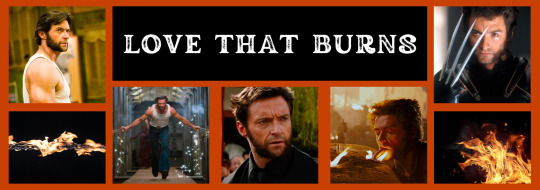
< previous chapter
Word Count: 3,850ish
Summary: On the road, your group finds a family in need of help.
Warning(s): lots of movie dialogue, canon violence, injuries, character death(s)
Reminder: I DO NOT do taglists. Please don’t ask. Please follow and interact! I appreciate any reblogs, likes, comments, and asks!

The four of you found yourselves back on the road soon after the wedding ceremony. Things seemed lighter in a way. Laura and Charles sat in back while Logan drove and you sat beside him. Logan kept one hand on the wheel while his other kept a firm hold on yours. He didn’t want to let you go before your marriage was official, but now he really didn’t want to.
Charles was drifting in and out of sleep as Laura stared out the window with her sunglasses, locking and unlocking the door.
“Knock it off,” Logan said, voice gruff. Laura made no move to stop. “I said, knock it off!”
“She’s a child, Logan,” Charles said. “And, point of face, she’s your—“
“How long has it been since you took your meds?” Charles exhaled, annoyed. “Tell me, how long has it been?”
“I don’t know!”
Logan scoffed. “You saw what happened yesterday. If that shit had gone on any longer, everything in that casino—“
“I did what I had to do to save Laura and Y/N.”
“What?” You questioned, turning to look back at Charles.
“I knew you wouldn’t get to my meds and I kept you from doing so. You wouldn’t have been able to take on all those men while protecting Laura and I.”
“You had a fucking seizure on purpose?!” Logan exclaimed, clearly furious.
“I guess you prefer me pharmaceutically castrated, rambling on like a lunatic. So much easier for you.”
“Easier? There is nothing easy about you, Charles, nothing!”
“Yes, yes, please be like the rest of the world, blaming someone else for your boring shit.”
“I know, Pop, I’m such a giant disappointment.”
“What? Logan, you’re not a disappointment,” you tried to interject.
“You honestly derive no sense of purpose from what we’re doing?” Charles continued.
“Okay, what are we doing?” Logan questioned. “Hmm?”
“There is a young mutant sitting in our car.”
“Yeah, I see that.”
“And where we’re taking her, there are others. Does that mean nothing to you?”
“Yeah, means nothing to me. Especially since Nurse Gabriela made all that Eden shit up with fucking comic books.”
“What are you talking about?”
Logan let go of your hand and opened the center consul. He pulled out a bottle, handing it to you. “Give those to him, will you?”
“Logan,” you tried.
“Give ‘em to him.”
You sighed, opening up the bottle and taking two pills out. You turned back and handed them to Charles, giving him a sympathetic smile. Charles took them and tossed them into his mouth before getting a drink.
“I wanna see it,” Logan said, looking at Charles.
Charles made a noise as he opened his mouth and stuck his tough out for Logan to see. Logan took the bottle from you, threw it into the consul, and then slammed it shut. You sighed, so much for the happiness that the small wedding brought. Logan glanced over at you as you stared out the window. He took your hand and brought it up to his lips for a kiss.
“Sorry,” Logan muttered. “On edge.”
“Clearly,” you replied, turning to face him. “Can you try not to be mad at anyone in this car? The rest of the world, sure, but those in this truck are off limits. Got it?”
“Only for you.” He kissed the back of your hand again.
“Whipped,” Charles muttered.
“Have something to tell the class Professor?”
“Nothing.”
Your group fell into a calm silence for a few moments until one of the auto-semi-trucks moved too close to your truck.
“Motherfucking auto-trucks!” Logan exclaimed.
“Language, Logan,” scolded Charles. “And you’re screaming at a machine.”
“Oh, what? She can gut a man with her feet, she can’t hear a few naughty words, huh?”
“She can learn to be better.”
“You mean, better than me?”
“I’m sure that’s not—“
“Actually, yes,” Charles interrupted you.
You knew Charles wasn’t totally in his right mind, but you wished he could fully realize how much his words affected Logan.
“And, by the way,” continued Charles, “Laura’s foot claws are the obvious result of her gender, you know.”
“Is that a fact?” Logan asked.
“In a pride of lions, the female is both hunter and caregiver.”
“Good to know.”
“She uses her front claws for hunting and the back claws defensively.”
“Oh, yeah?” Logan’s sarcasm was clear.
“Thus, ensuring their survival.”
Laura watched this—and every— interaction with curiosity and caution. It was clear to her that her comics were right about somethings. One being that the Wolverine was tough and hostile, but had a soft side for those he cared about. Especially for you. Though the comics Nurse Gabriela had shown her did not do the love you two shared any justice, both the good and the bad. Laura could tell that Logan didn’t know how exactly to deal with Laura and who she was, but she could tell that the hostility was dying, though extreme slow. Laura knew that was thanks to you. As she continued to watch and listen, you looked back to check on her. You shot her a soft smile. Laura wanted to give you one in return, but she really didn’t know how, so she opted for a nod and to turn back to the window.
Just then, an auto-truck honked and began to move over to the lane that your truck was in without even waiting. Logan was forced to swerve quickly, driving into oncoming traffic. Laura held onto Charles trying to keep him steady while you gripped the handle near your door and the middle consul. Logan maneuvered through the oncoming traffic until there was a clearing and he could turn around, coming to a harsh stop. He looked around, noticing that everyone was clearly shaken up.
As the four of you tried to calm down, you watched as a truck pulling a horse trailer stopped across the road. The horse trailer had been knocked open in the incident, with the horses running out. A young man and his parents got out of the truck, rushing to get the horses off the road.
“We should help them,” Charles suggested.
“No, we have to keep going,” Logan retorted. “Someone will come along.”
“Someone has come along.”
Logan looked your way, wanting to know your thoughts.
“I think it would do us some good to help someone else right now,” you told him.
With a sigh, Logan drove the truck across the lanes of traffic and parked it in front of the other truck. Charles rolled down the window and closed his eyes as you and Logan exited the truck. You watched as the horses all came back over and lined up in the trailer. Logan looked back over at Charles with a angry look. You caught it, slipping your hand into Logan’s and giving it a light squeeze. Laura slipped out of the car and stood a bit behind you two.
“Hey, uh, you need a hand?” Logan asked.
“Yeah,” the woman replied. “Our truck is stuck. After we get the horses in, we could really use some help getting it out.”
Once the horses were in the trailer, the woman got into the driver’s seat and turned on the truck to help reverse it. Logan and her husband got in front to push it while the son was helping from the side. Once they were all set, they started moving the truck back.
“Ah, good,” the husband patted the front as soon as the truck had moved to a good spot, “got it. Come on, let’s get home.”
“Laura! Y/N!” Logan called. The two of you were standing near the trailer, Laura looking at the horses.
“Thank you so much for your help,” the woman said. “I’m Kathryn.” She reached out her hand.
Logan shook it. “James.”
“This is my son, Nate.”
“Hi,” Nate said.
“Hey,” Logan responded.
“Is that your wife and daughter?” Kathryn asked.
“Uh, yeah, thats, uh—“
“I’m Y/N,” you walked up to Kathryn, “his wife. That’s our daughter Laura.”
“Yeah, and that’s my dad, Chuck,” Logan pointed to Charles in the truck, who waved. “Come on, Laura, let’s go.”
“Well, can we show our appreciation and treat the four of you to a decent meal?” Kathryn wondered. “We don’t live far from here.”
“Uh, no, thanks.”
“That would be lovely!” Charles exclaimed.
You stifled a giggle at the look Logan shot Charles. You walked over to Logan and took his hand. “As long as we aren’t a bother,” you told Kathryn.
“Of course not,” she said. “Just follow us home.”
~~~
“I don’t like this,” Logan grumbled as the table was being set. “We need to keep moving.”
“Logan, it’s just one night,” you told him. “No one would suspect us to stop somewhere like this.”
“Still.”
“Everybody, have a seat,” Kathryn said.
“James, why don’t you sit at the end of the table?” Will, Kathryn’s husband, suggested.
Will sat on one end while Logan took the opposite seat. Kathryn and Nate took one of the longer sides, while Charles, Laura, and you took the other.
“You wanna say grace?” Kathryn asked. “Say grace, baby.”
“Uh, thank you, God, for this food,” Nate said, “and for our new friends, the Howletts.
“Mmm. They came to our aid. Amen.”
“Amen,” you joined in with the rest in saying it.
Everyone began eating. Logan noticed quickly that Laura was stuffing the food into her mouth using her hands. He reached over and handed her, her fork. The bowl of corn got passed to her and she quickly began scooping. Logan took the bowl away before she could take it all. You bit your lip as you noticed how the others were watching you all.
“Oh, there’s plenty more if she wants,” Kathryn offered.
“She’s fine,” Logan said. “Thank you.”
“This is delicious,” Charles said.
“Oh, thank you,” Kathryn responded.
“It’s so good.”
“Where are you all headed?” Will asked.
“Uh, Oregon,” Logan said at the same time that Charles said, “South Dakota.”
“Well, Oregon and then South Dakota,” Charles corrected.
“Vacation?” Kathryn wondered.
“Uh, yes. Uh, long overdue. We’re city folk. Always wanted to take a road trip, see the country. And meet the people in it.”
“Well that sounds lovely. Been trying to get Will here to take a vacation for years now.”
“If we go traipsing all over the country, who’s gonna take care of this place?” Will retorted.
“Exactly. I say, let it go.”
“And live off what?”
“The Lord will provide.”
“I”m still waiting for the Lord to provide me with a new thresher.”
“All the same, I’d love to travel someday.”
“And I bet, you will,” Charles told her.
“I could drop out of school,” Nate offered.
“Okay, let’s not go that far,” Kathryn said.
“I mean, I’ll do it.”
“No, no.”
“Why not? You wanna travel, I wanna travel.”
“Son, son.”
“That sounds good to you, right?” Will asked.
“It’s the perfect plan,” said Nate.
“Why oddly you want to do that, Nate?” Charles wondered.
“Careful,” Logan spoke up, “you’re speaking to a man who ran a school for a lot of years. Right, Charles?”
“Really?” Will asked.
“Yes, it was a… it was a special needs school,” Charles said.
You tried not laugh at his description.
“Uh-huh. That’s a good description,” Logan smirked.
“He was there, too,” Charles pointed at Logan. “In fact, these two both were.”
“Yeah, I got kicked out a few times.”
“Some of them were by choice,” you spoke up, teasing him.
“I wish I could say you were a good pupil, but the words would choke me,” Charles said.
Everyone laughed, including Logan.
“Not that Y/N was much better,” Charles added.
“Wait, what?” You questioned.
“When Y/N first arrived at the school, she hid and refused to participate. Took me years to get her to do anything.”
“Hey, woah. Not years. Maybe one.”
“Whatever.”
The laughter and chatter continued until everyone was full. Logan stood up.
“Ma’am, I can’t thank you enough for this,” he said. “Uh, it was great. But we have a long drive ahead of us, so—“
“But you need to rest, don’t you?” Kathryn questioned.
“Yeah, we’ll find a motel somewhere.”
“The nearest one is two hours from here and it’s not even that nice,” Will said.
“We have a perfectly fine room upstairs for your father and your daughter if you don’t mind you and your wife sleeping in the living room on the convertible,” Kathryn offered.
“Kathryn, it’s very, very nice of you, but we really should go.”
“We can leave early in the morning,” Charles said. “Break of dawn, as it were.”
Logan looked at you, hoping that you’d side with him. You weren’t going to though. It was nice to interact with others and seem normal for a while.
“Okay,” Logan sighed, “why don’t we wash up, Pop?”
Logan pushed Charles away to the bathroom.
“Would you two like some dessert?” Kathryn offered.
“If it’s not too much trouble,” you replied.
“Of course not.”
“You all have been really kind to my family. Thank you.”
The water coming from the sink suddenly cut in and out.
“Oh, shit!” Will exclaimed.
“What’s going on?” Logan asked, stepping out of the bathroom.
“Nate, go fill up the tub before we lose pressure.”
“They shut if off again,” Kathryn said.
“They are just not going to let this thing go.”
“Well, you might as well handle it now.”
“It can wait till the morning. We just had rain last night.”
“We got four houseguests and a sink full of dishes.”
“Alright, alright.” Will turned to talk to Logan. “The pump station that supplies us is a mile and a half from here. Sometimes it gets itself shut off.”
“By assholes,” Nate added.
“My son is happy to go with you,” Charles offered.
“No, no, no, that’s fine,” Will said as Logan gave Charles a look of unbelief. “The men that do this, sometimes they can be—“
“I can go,” Nate said.
“No,” Kathryn said, “you’ve got homework.”
“Alright, I’ll go,” Logan said. “Just, uh, let me get my dad settled.”
He walked over to Charles and picked him up. Your heart broke as you could hear the strain in Logan’s breathing. You took Laura’s hand and followed Logan and Charles up the stairs to the open bedroom. Laura saw Nate in his room and opted to follow him.
“Behave,” you whispered to her with a smile before letting her go.
You peeked into the room, watching Logan get Charles tucked in. He held up a remote.
“Want TV?” Logan asked. “There’s TV here.”
“I’m fine,” Charles breathed out.
“Okay. Get some rest.”
“You know, Logan… this is what life looks like. A home, people who love each other. Safe place. You should take a moment and feel it. It’s been too long since you’ve had that.”
“Yeah It’s great.” You stepped back as Logan came to the door.
“Logan. Logan! You still have time.”
“Charles, the world is not the same as it was. We’re taking a risk hanging around here, you know that. And where we’re going, Eden… it doesn’t exist. Her nurse got it from a comic book. You understand? It’s not real.”
“It is for Laura… It is for Laura.”
“Get some rest.”
Logan walked out of the room, completely shutting the door, to find you there.
“What are we doing, Logan?” You asked quietly. “If you don’t believe that Eden is real, then where are we taking Laura? What are your plans with her?”
Logan sighed, coming up to you and placing his hands on your arms. He ran his hands down until he could hold your hands. “I… I’m trying here.”
“Try harder… for Laura, for Charles… for me. You need to decide if you believe in it and if you’re willing to trust that Eden will be a safe place for your daughter.”
“Do you believe in it?”
“I hope it’s real. For her sake.”
“Then I’ll try a little harder, okay?” You nodded, leaning into Logan. His hands dropped yours to wrap you in a hug. “I won’t be long.”
“Be safe.”
The two of you met for a brief kiss. You walked Logan down the stairs and watched as he and Will headed out to the fields. You saw Kathryn in living room, reading the pull-out bed.
“Thank you, again,” you told her.
“Of course,” she replied. “It seems like you all have had a long journey and need some good rest.”
“Yeah,” you nodded.
“The bed’s all ready. Sleep well.”
Then Kathryn walked away. You crawled onto the bed and curled up, thinking of Logan. You heard footsteps just as you were about to fall asleep, the weight was familiar. Your back was facing towards the slow, on coming footsteps.
“Logan?” You whispered quietly, only to receive no verbal response.
A hand fell to your back, moving until it was above your beating heart.
“Logan, what are you—“
Quickly, the hand formed a fist and three metal claws entered your heart. The darkness came instantly.
~~~
When Logan and Will arrived back at the house, Logan went to the truck to try to calm down his coughing. A gunshot and screams had his head snapping in the direction of the house. Logan raced inside the best he could with his limp. Will was at the bottom of the stairs, claw marks through his chest. Logan looked up to see a copy of him—younger and less scarred—carrying a screaming and bound Laura down the stairs. Logan froze, only able to pant and stare as the copy of him walked past him, Laura still screaming.
“Charles!” Logan shouted up the stairs. “Y/N! Charles! Y/N!”
He used the railing to get him up the stairs faster. At the top of the stairs, he found Kathryn dead with Nate at the entrance of Charles’ room. He froze for a moment upon seeing Charles bloody and barely breathing in bed. Blood was running out of Charles’ mouth as he shakily reached for Logan.
When Logan finally broke out from his trance, he rushed over and used some of the bedding to pack Charles’ wound. He maneuvered Charles’ hands to be over the bedding.
“Hold this,” Logan whispered, fear coursing through his veins. “It wasn’t me. It wasn’t me.”
Logan picked Charles up carefully, still scanning the house for any sign of you. Charles let out a moan as he struggled to keep conscious.
“Just hold on, Charles,” Logan said.
Logan went out the side door and rushed Charles over to the truck, placing him in the bed.
“I’ll be back,” Logan promised, before going back inside. “Y/N! Y/N!”
Suddenly, his nose got whiff of a familiar scent. Your blood. He rushed for the living room, where the pull out bed was out. There was a large bloody stain on it, but no you. There was no sign of your fire or your smoke or your ashes. Logan’s heart hammered in his chest as he continued to find no sign of you in the house. Logan stammered out of the house to hear more screaming and gunshots. He saw his duplicate self killing the men who turned off the water. There was a military grade truck past his duplicate. Logan noticed Laura on the ground but when he his moved, his breath caught in his throat.
They had you in a glass box, like Snow White or a doll. There was blood on you and Logan could tell from where he was standing that you weren’t breathing.
“Charles!” Logan exclaimed quietly. He went back over and pressed on the wounds. “Hold this down, right now, tight!”
“Save them,” Charles whispered. “I’m… sorry…”
“What?”
“Go…” Then Charles heart stopped.
“No.”
Rage grew inside Logan. How dare they create a duplicate version of him and have him kill you and Charles? He had to get to you before they did anything. Suddenly, the military truck blew up, throwing the glass case you were in forward, crashing next to Laura. The glass broke. Logan needed to move fast. He knew that if you went up in flames and your ashes were separated, there would be no coming back for you. He wouldn’t be able to continue on the rest of his short life without you.
Logan snuck up on his duplicate as the duplicate marched towards you and Laura. With each grunt, he plunged his claws into the duplicate. But his copy made no move to fight back, just walking backwards with each hit. Logan plunged both sets of claws into the copy.
“What the hell are you?” He grunted.
The duplicate stabbed Logan in the shoulder and tossed him over to the ground. Logan shielded himself with his claws before the duplicate could do it again. Every muscle and bone was straining with Logan, but he couldn’t stop. Not when you weren’t safe. Logan jumped back up and continued fighting, but the duplicate was better, stronger. The copy kept making hits, causing Logan to yell out in pain.
Eventually, the duplicate had Logan pinned against a large tractor tire. Before it could make the final kill, Will’s truck rammed into the duplicate, pinning it against the fence. Will stumbled out of the truck with his gun, shooting into the duplicate multiple times. Once Will believed the duplicate to be dead, he turned his gun on Logan, but couldn’t do anything before he fell to the ground, dead.
Laura’s shrieking continued as she laid bound beside your dead body. Logan stumbled over to the two of you, bloody and bruised. He knew that you needed to get someplace safe, but he also knew that you would never forgive him for leaving Laura. He grabbed Laura and carried her over to the truck, placing her into the seat next to his before turning to get you.
As he knelt beside you to pick you up, the tears fell. The three punctures over your heart was enough to tell him that his copy had done this to you. He groaned as he picked you up and cradled you against him.
“It wasn’t me,” he whispered, like him saying that would wake you. “It wasn’t me.”
He carried you to the truck and slipped you into the back seat. Laura turned around and saw Charles dead in the bed of the trunk and you dead in the back seat. Her shrieking got worse as she fought against her bindings. Logan turned on the truck and sped off into the fields. Laura thrashed around, trying to free herself. With a shaky hand, Logan released his claws.
“Hold still,” he told her, moving the claws over to her cuffs. “Hold still.”
He cut through the bindings and quickly put away his claws, focusing on driving through the field. Laura crawled into the back seat and placed your head on her lap. Logan glanced at her through the rearview mirror, not missing the tear that slipped down her cheek.
next chapter >
#james logan howlett x reader#logan howlett x reader#logan howlett imagine#logan x reader#logan howlett#james logan howlett#logan howlet x reader#logan howlett x y/n#logan howlett x female!reader#logan howlett x you#logan howlett x mutant reader#logan howlett x f!reader#logan howlett x fem!reader#wolverine fanfiction#the wolverine#wolverine#wolverine x reader#x men x reader#marvel fanfic#marvel fanfiction#marvel x reader#old man!logan x reader
81 notes
·
View notes